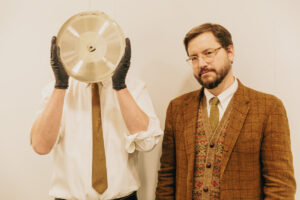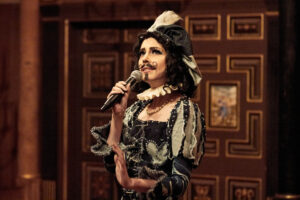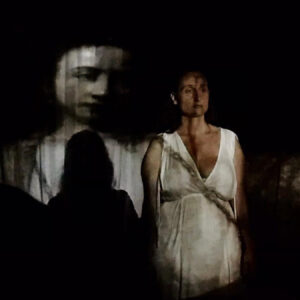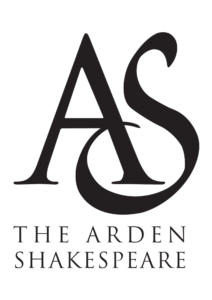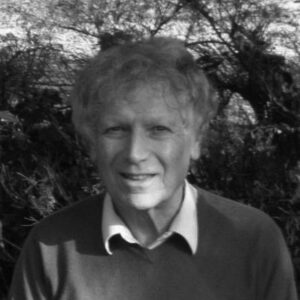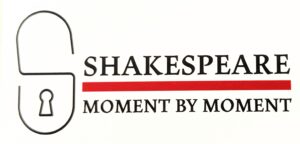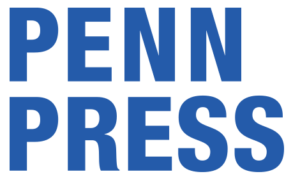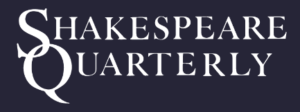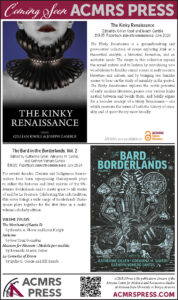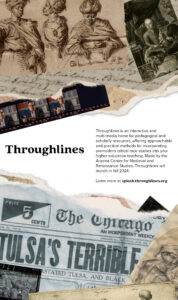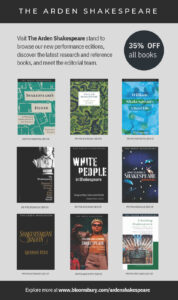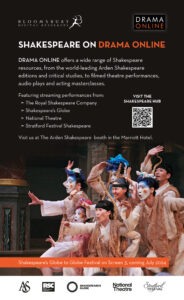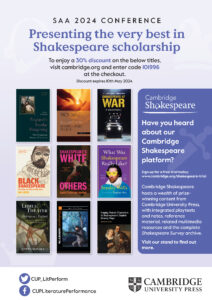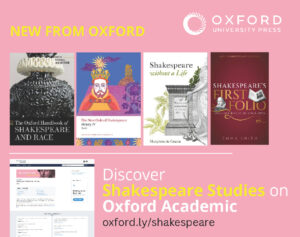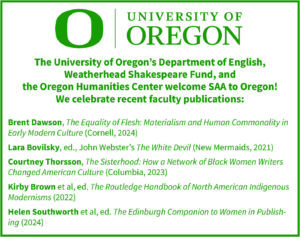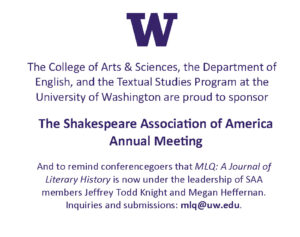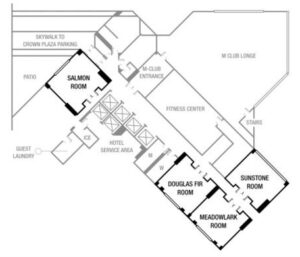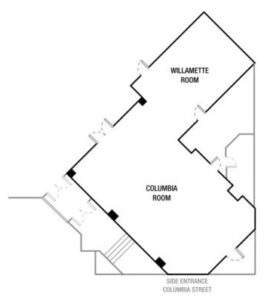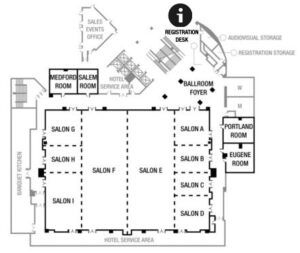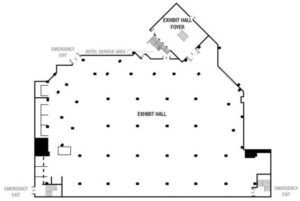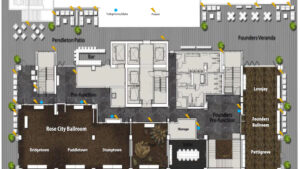2024 Meeting Program and Schedule
10 April ➤
11 April ➤
12 April ➤
13 April ➤
10 April ➤
4:00 to 7:00 p.m.
Registration
Advanced Onsite Registration
📌 Marriott LL1: Registration
6:00 to 7:00 p.m.
Cash Bar
📌 Marriott LL1: Ballroom Foyer
Open to all registrants and their registered guests.
11 April ➤
8:00 a.m. to 6:00 p.m.
Registration
📌 Marriott LL1: Registration
Book Exhibits
📌 Marriott LL2: Exhibit Hall
8:00 to 9:00 a.m.
Professionalization
Meet-and-Greet with Journal Editors
📌 Porter: Puddletown-Stumptown
ORGANIZER: Jeremy Lopez, Shakespeare Quarterly
Join the editors of several peer-reviewed journals for coffee and informal conversation about submitting work for publication: what to submit, where to submit, and what to expect after you’ve submitted it. All are welcome, and early-career scholars are particularly encouraged to attend.
8:30 to 9:30 a.m.
Book Launch
📌 Marriott LL1: Ballroom Foyer
Celebrate books published this year.![]()
Professionalization
SAA Labor Organizing Coffee Hour
📌 Marriott 2F: Mount Hood
Eileen Sperry, Skidmore College and Dyani J. Taff, Colby College
Sponsored by SEIU Local 200United.
This gathering is meant to provide a space to connect and share experiences about labor organizing movements across academia. We invite new-comers and old-hands alike to attend: all who have worked on faculty union campaigns, been a part of graduate student unions, or who have always wanted to learn more about labor organizing. Join us for coffee, donuts, and solidarity!
9:00 to 10:00 a.m.
Meeting
World Shakespeare Congress 2026: Information Session
📌 Marriott LL1: Salon I
All delegates are welcome to find out more from the International Shakespeare Association about the World Shakespeare Congress in Verona in 2026.
10:00 a.m. to 12:00 noon
Seminar
Anglo-Hispanisms
📌 Marriott LL1: Salon A
LEADERS: Eric J. Griffin, Millsaps College, José A. Pérez Díez, University of Leeds, and Alexander Samson, University College London
Nation-centered literary histories have been complicated by transnational approaches viewing our canons as rooted in communities whose national languages and cultures were merely emergent. Taking the Anglo-Hispanic relationship as a nexus of intersection, this seminar welcomes papers examining the ways “Anglo-Hispanisms” figure in early modern drama and all related genres. Approaches might include questions of influence, representation, ideology, otherness, performance, and theatrical practice.
- Joyce Boro, Université de Montréal
- Juan F. Cerdá, Universidad de Murcia
- Mayra A. Cortes, University of California, San Diego
- Barbara Fuchs, University of California, Los Angeles
- Sarah Grunnah, Weber State University
- Robin Alfriend Kello, University of California, Los Angeles
- Victoria Muñoz, Hostos Community College, CUNY
- Ana Sáez-Hidalgo, Universidad de Valladolid
- Gabriela Villanueva, Universidad Nacional Autónoma de México
Seminar
Asian Shakespeares: Translation, Adaptation, Interpretation
📌 Marriott LL1: Salon G
LEADERS: Mark Thornton Burnett, Queen’s University Belfast and Jessica K. Chiba, Shakespeare Institute, University of Birmingham
Sparked by scholarship, festivals, anime/manga films, translation projects and digital resources, this seminar explores trends in “Asian Shakespeares.” Understanding Asia as polyvocal and transnational, we reflect on the field via three overlapping areas: translation, adaptation and interpretation. This allows us to consider the play/adaptation relationship, intersections with gender studies/critical race studies, and the local/global interpretive role Shakespeare plays in Asian contexts.
- Thea Buckley, Queen’s University Belfast
- Melissa Croteau, California Baptist University
- Yehrim Han, Korea National Open University
- Taylor Yoonji Kang, Yale University
- GeonLyung Kim, University of Minnesota
- Hyon-u Lee, Soon Chun Hyang University
- Jason Eng Hun Lee, Hong Kong Baptist University
- Ashley-Marie Maxwell, Université de Montréal
- Taarini Mookherjee, Queen’s University Belfast
- Tanya Schmidt Morstein, Stanford University
- David Nee, Harvard University
- Shuo Niu, University of York
- Tripthi Pillai, Coastal Carolina University
- Pankhuri Singh, University of Exeter
- Brittany Bin Tang, Chinese University of Hong Kong
Seminar
Costume, Scenography, and the Role of the Designer in Performance
📌 Porter: Pettigrove
LEADER: Ella Kirsty Hawkins, Royal Welsh College of Music and Drama
This seminar considers how visual production elements shape the meanings of early modern plays in performance. How do costumes, scenery, props, and lighting enable a particular interpretation of the text? To what extent can design make early modern plays speak to contemporary issues? Welcoming papers concerned with any aspect of design for early modern drama—historical or contemporary, stage or screen—this seminar seeks to recenter the work of the designer in discussions of performance.
- Stephen M. Buhler, University of Nebraska, Lincoln
- Angeline Morris, University of Alabama
- Christine Roth, University of Wisconsin Oshkosh
- Amos Rothschild, St. Thomas Aquinas College
- Nicole Sheriko, Yale University
- Michael Ullyot, University of Calgary
Seminar
Criminal Shakespeares
📌 Marriott LL1: Salon D
LEADERS: John S. Garrison, Los Angeles, CA, Kyle A. Pivetti, Norwich University, and Vanessa L. Rapatz, Ball State University
This seminar invites explorations of both Renaissance criminality and modern crime and noir fiction depictions, incl. film, novels, period pamphlets, or personal journals. How is Shakespeare deployed as a figure of class or morality? How is crime defined through sexuality, gender, or body? And how does Shakespeare generate a vocabulary for criminals to reveal the systems against which they transgress?
- Meredith Beales, University of British Columbia
- Frederick Bengtsson, University of Kentucky
- Liz Fox, University of Massachusetts, Amherst
- Adrian Howe, University of Melbourne
- Bernadette Kelly, Wayne State University
- Jennifer Lillian Lodine, Montana State University, Billings
- Jonathan Shelley, St. John Fisher University
- David A. Summers, Capital University
- William Floyd Wolfgang, Stevenson University
Seminar
Cutting and Pasting in Renaissance England: Gender, Authorship, and the Use of Others’ Words
📌 Marriott LL1: Medford
LEADERS: Julie Ann Eckerle, University of Minnesota, Morris and Erin A. McCarthy, University of Galway
This seminar will consider the recursive relationship between early modern women’s reading and writing. At a time when print and manuscript publishing informed one another, women were also creating their own texts, often by drawing creatively upon published works by other writers. Essays may focus on single or multiple authors to consider the full range of writers’ uses of others’ texts, including but not limited to copying, cutting, appropriating, and compiling in any form, language, or medium.
- Joseph Black, University of Massachusetts, Amherst
- Chloe Brooke, Wayland Baptist University
- Emily C. George, University of Washington and South Seattle College
- Jennifer Higginbotham, Ohio State University
- Emily G. Jones, University of South Florida
Seminar
Damaged, Decayed, Destroyed, Disappeared
📌 Marriott LL1: Eugene
LEADERS: Anna Reynolds, University of Sheffield and Misha Teramura, University of Toronto
This seminar invites papers that explore decaying, damaged, and lost objects, whether textual, theatrical, archival, or imagined. How did the early modern world understand such objects, and how do they shape our understanding of the early modern past? Essays might consider fragments, ruins, vandalism, theatrical properties, missing or destroyed documents, archival silences, waste, recycling, retrieval, or restoration.
- Charlotte Artese, Agnes Scott College
- Anna Riehl Bertolet, Auburn University
- Loreen L. Giese, Ohio University
- Megan Heffernan, DePaul University
- Miriam E. Jacobson, University of Georgia
- Jonathan Koch, Pepperdine University
- Victor Lenthe, Bilkent University
- Jeanne H. McCarthy, Georgia Gwinnett College
- Anne M. Myers, University of Missouri
- Rebecca Olson, Oregon State University
- Maria Shmygol, University of Galway
- Christine Varnado, University at Buffalo, SUNY
- Eunwoo Yoo, University of California, Santa Barbara
Seminar
Dance on and Beyond the Early Modern Stage
📌 Porter: Lovejoy
LEADER: Seth S. Williams, Barnard College of Columbia University
How does dancing—or any motion that we might view as a kind of choreography—reconfigure social relations, construct identities kinetically, or throw systems of knowledge off balance? This seminar welcomes scholars who are curious about but not expert in dance studies, and who wish to discuss plays or any literature that stages scenes of aestheticized, politicized motion, whether solo or corporate, designed or improvised. Paired with an optional practicum, “Trampling the Archive.”
- Heidi Brayman, University of California, Riverside
- Judith P. Clark, Stephens College
- D. J. Hopkins, San Diego State University
- Vanessa Lim, Seoul National University
- Lynsey McCulloch, Royal Shakespeare Company
- Linda McJannet, Bentley University
- Elisa Oh, Howard University
- Jade Elizabeth Standing, Queen’s University
- Emily F. Winerock, Shakespeare and Dance Project
Seminar
Dis/ability and Racial Capitalism in Shakespeare and Beyond
📌 Marriott LL1: Salon C
LEADERS: Andrew Bozio, Skidmore College and Penelope H. Geng, Macalester College
This seminar welcomes work on the intersection(s) of race, class, and dis/ability in Shakespeare and related texts. Such work could include efforts to theorize and historicize the interplay of dis/ability, race, and class in drama, the linking of citizenship to whiteness and able-bodiedness, or the disabling consequences of racial capitalism. How might a study of the interlocking histories of dis/ability, race, and class in Shakespeare inspire and complicate our work as scholar-teachers?
- Susan L. Anderson, Staunton, VA
- Deyasini Dasgupta, Syracuse University
- Eric Dunnum, Campbell University
- Theo Fox, York University
- Taylor Hare, Pennsylvania State University
- Nicole A. Jacobs, California Polytechnic State University
- Anna Kowalcze-Pawlik, University of Lodz
- Maya Mathur, University of Mary Washington
- Anandi Rao, SOAS, University of London
- Lindsey Row-Heyveld, Luther College
Seminar
Drama and the Public Sphere
📌 Marriott LL1: Salon H
LEADER: Stephen Wittek, Carnegie Mellon University
This seminar will consider the relation between early modern drama and an incipient public sphere—or what some critics refer to as the “proto-public sphere.” Projects that consider drama outside of the Shakespearean canon are particularly welcome. Potential areas of focus include: drama and topical representation, the discursive affordances of theatrical space, publics and public-making, theatrical counter-publics, cultures of spectatorship, drama and news, textual publics, and dramatic representation of public activity.
- Rocio Corral Garcia, Cornell University
- Méline Dumot, UCA, Clermont Ferrand
- Edward Gieskes, University of South Carolina
- John C. Higgins, Case Western Reserve University
- Bill Kerwin, University of Missouri
- András Kiséry, City College of New York, CUNY
- Tonhi Lee, Tufts University
- Sandra A. Logan, Michigan State University
- Allen M. Loomis, Binghamton University
- Dustin M. Meyer, University of Toronto
- Sharon O’Dair, University of Alabama
- Vimala C. Pasupathi, Hofstra University
- Johaeng Rho, Saint Louis University
- Christi Spain-Savage, Siena College
- Simone Waller, Reed College
Seminar
Early Modern Book History: The State of the Field
📌 Marriott LL1: Salon B
LEADERS: Heidi Craig, University of Toronto and Georgina Wilson, Fitzwilliam College, University of Cambridge
What are the defining features of book history today, and where do we want it to go tomorrow? We invite participants to reflect on book history’s recent shifts towards heterogeneous, global, local, democratic, and subjective areas of study. One goal is to determine how to identify and communicate methods in all their complexity and eclecticism. What is at stake in the future of the field, and what can we learn about our political and aesthetic priorities in the way we do book history now?
- Brandi K. Adams, Arizona State University
- Lucie I. Alden, University of Virginia
- Andreas Patrick Bassett, University of Washington
- Jessica Beckman, Dartmouth College
- Marlin E. Blaine, California State University, Fullerton
- Megan E. Fox, University of Wisconsin, Madison
- Adam G. Hooks, University of Iowa
- Jeffrey T. Knight, University of Washington
- Jonathan P. Lamb, University of Kansas
- Zachary Lesser, University of Pennsylvania
- Alan H. Nelson, University of California, Berkeley
- Elizabeth J. Rivlin, Clemson University
- Valerie Wayne, University of Hawaiʻi
- Mary Erica Zimmer, Massachusetts Institute of Technology
Seminar
Energy Transitions in Long Modernity
📌 Marriott 3F: Salmon
LEADERS: Todd A. Borlik, University of Huddersfield and Tiffany J. Werth, University of California, Davis
This seminar asks participants to examine and theorize representations (or misrepresentations) of energy use and energy crisis in the long history of modernity, and to assess the role of literary texts in documenting, resisting, or imagining what we are calling “energy transitions.” We especially welcome papers that promote conversations across disciplinary and period boundaries to better gauge the longterm impacts of different energy regimes, revealing the ways in which they drive new forms of cultural expression and political organization.
- Joseph Campana, Rice University
- Kelly A. Duquette, Georgia Institute of Technology
- David B. Goldstein, York University
- Jemima Matthews, King’s College London
- Steve Mentz, St. John’s University
- Benjamin C. Miele, University of the Incarnate Word
- Bernadette Myers, New York University
- Vin Nardizzi, University of British Columbia
- Jeff Theis, Salem State University
- Rob Wakeman, Mount St. Mary College
- Robert N. Watson, University of California, Los Angeles
- Julian Yates, University of Delaware
Workshop
Practical Pedagogy for Early Modern Literature, Part One
📌 Marriott LL1: Portland
LEADERS: Jess Hamlet, Alvernia University, Courtney A. Parker, University of Alabama, and Eileen Sperry, Skidmore College
This pedagogy workshop aims to generate a wealth of classroom materials for teaching early modern drama and literature, including lesson plans, activities, discussion questions, secondary reading lists, and essay prompts. We hope to bring together junior scholars, contingent faculty, non-tenure track faculty, and faculty at teaching-focused institutions to share ideas and resources on a variety of early modern texts.
- Robin Bates, University of Lynchburg
- Ofir l. Cahalan, University of California, Davis
- Margaret Christian, Pennsylvania State University, Lehigh Valley
- Catherine R. Clifford, Hastings College
- Kurt Daw, San Francisco State University
- Jennifer Flaherty, Georgia College
- Nicole Hagstrom-Schmidt, Texas A&M University
- Emily MacLeod, Pennsylvania State University, Harrisburg
- Kristen K. Polster, Southern Methodist University
- Jay Zysk, University of Massachusetts, Dartmouth
Seminar
Reading for the Plantationocene in Early Modern Literary Cultures
📌 Marriott 3F: Douglas Fir
LEADER: Ashley Sarpong, California State University, Stanislaus
How does the “plantation”—a site of labor, extractive land use, and capital accumulation—situate early modern texts and cultural production within new considerations about the climate emergency? In what ways can we analyze how cultural objects depict ecologies of extraction, capitalism, colonialism, and racialization? Papers may consider broader inquiries about the relationships between eco-critical studies and studies of race, empire, or capital in the pre-/early modern world.
- Ryan Campagna, University of Chicago
- Kyle Grady, University of California, Irvine
- Ellen MacKay, University of Chicago
- Daniel Normandin, Marshall University
- Hillary M. Nunn, University of Akron
- John Yargo, Boston College
Seminar
Shakespeare and Science Fiction
📌 Marriott 3F: Meadowlark
LEADERS: Jim Casey, Tyler, TX and Brandon Christopher, University of Winnipeg
This seminar explores the intersection of Shakespeare and science fiction—from Asimov’s “The Immortal Bard,” to Forbidden Planet, to Star Trek, to Dr. Who, to The Expanse and beyond. We welcome essays that engage with Shakespeare in SF film, television, books, and comics; SF Shakespeare and adaptation; Shakespearean allusion in SF; Shakespeare, SF, and high/low culture; Shakespeare and SF genres; Shakespeare and theoretical approaches to SF; Shakespeare and SF gaming; or any related topic.
- Mary Adams, Western Carolina University
- Valerie M. Fazel, Arizona State University
- Michael D. Friedman, University of Scranton
- Jennifer R. Holl, Rhode Island College
- Erin K. Minear, College of William & Mary
- Mary Odbert, Shakespeare Institute, University of Birmingham
- Kelsey Ridge, Alvernia University
- Marsalene Elise Robbins, Ohio State University
- Esther B. Schupak, Bar-Ilan University
- Jeffrey Scott Squires, Carnegie Mellon University in Qatar
- Jacob A. Tootalian, Portland State University
- Jeanette N. Tran, Drake University
- Erin Webster, William & Mary
- Julia Wold, University of Connecticut
Digital Exhibit
CADRE: Co-Authored Drama in Renaissance England
📌 Marriott LL2: Exhibit Hall
EXHIBITOR: Rory Loughnane, University of Kent
Inspired by the Lost Plays Database, CADRE or Co-Authored Drama in Renaissance England is a wiki-style forum for scholars to share evidence and information about the coauthorship–a term that includes practices of collaboration, revision, and adaptation–of early modern plays and other entertainments.
Digital Exhibit
Early Modern Songscapes
📌 Marriott LL2: Exhibit Hall
EXHIBITORS: Katherine R. Larson, University of Toronto, Scott A. Trudell, University of Maryland, and Sarah F. Williams, University of South Carolina
Early Modern Songscapes is an interdisciplinary collaborative project focusing on 16th- and 17th-century English song. Our beta website offers users a chance to see, hear, and explore early modern English “ayres,” or songs with a primary vocal line. The SAA digital exhibit will allow us to open up questions about 1) best practices for digital preservation, 2) how Early Modern Songscapes might generate future work on song’s multidimensionality in the early modern context, and 3) creative approaches to scholarly transmission.
Digital Exhibit
London Stage Database
📌 Marriott LL2: Exhibit Hall
EXHIBITOR: Mattie Burkert, University of Oregon
The London Stage Database is a peer-reviewed, open-access website that allows users to explore theatrical performance records from the period that arguably invented “Shakespeare” as we know him: the long eighteenth century. As a digital exhibitor, I aim to connect with new and existing users and to seek input that will help shape the next phase of active project development.
Digital Exhibit
MoEML Mayoral Shows
📌 Marriott LL2: Exhibit Hall
EXHIBITOR: Mark Kaethler, Medicine Hat College
MoEML Mayoral Shows is an open-access anthology of sixteenth- and seventeenth-century mayoral shows. The project uses the Map of Early Modern London’s GIS to situate these early performances at the spaces where the pageants were staged. It aims to provide updated modern-spelling scholarly editions of these texts alongside diplomatic transcriptions for classroom purposes as well as scholarship related to these civic performances.
Digital Exhibit
The Stratford Heritage Guide
📌 Marriott LL2: Exhibit Hall
EXHIBITOR: Katherine I. Knowles, Michigan State University
This mapping and text analysis project analyzes the evolving narratives surrounding cultural heritage sites in Stratford-upon-Avon. It explores how Shakespeare’s legacy is constructed spatially through the town and how, despite the locations described remaining fundamentally the same across different guidebooks, the stories around heritage sites are continually reshaped.
1:30 to 3:00 p.m.
Shakespeare Futures Roundtable
Ruining and Repairing Shakespeare: New Political Adaptations
📌 Marriott LL1: Salon E
ORGANIZERS and CHAIRS: Sandra Young, University of Cape Town and Christina Wald, University of Konstanz
Alexa Alice Joubin, George Washington University
Race-making and Transing Gender in Reparative Shakespearean Performance
Douglas M. Lanier, University of New Hampshire
De-cruiting Shakespeare: Reparativity, Social Justice and Cry Havoc
Christina Wald, University of Konstanz
Ruining and Rebuilding Hamlet in Ukraine: The Hamlet Syndrome and H Effect
Sandra Young, University of Cape Town
Refuse, Reduce, Reuse, Repurpose: The Radical Creative Practice of Contemporary AdaptationPanel
3:30 to 5:30 p.m.
Seminar
Ambivalence, Part One
📌 Marriott LL1: Salon A
LEADERS: Frances E. Dolan, University of California, Davis and Valerie Traub, University of Michigan
As a theme, ambivalence has been central to Shakespeare studies, where it has largely been conceptualized as pertaining to individual psychic conflicts. Over the past twenty years, however, ambivalence has begun to be invoked by queers and feminists to describe an affirmative capacity, a political emotion, and structural condition of life under neo-liberalism. This seminar offers an opportunity to engage with the concept of ambivalence through this broader, more political lens.
- Patricia Akhimie, Folger Shakespeare Library
- Bernadette Andrea, University of California, Santa Barbara
- Ronda Arab, Simon Fraser University
- Amanda B. Atkinson, Southern Methodist University
- Beatrice Bradley, Muhlenberg College
- James M. Bromley, Miami University
- Gina Filo, Southeastern Louisiana University
- Emily Glider, Yale University
- Joanna Huh, University of Cincinnati
- Erin E. Kelly, University of Victoria
- Ágnes Matuska, Szegedi Tudományegyetem
- Maria Sequeira Mendes, Universidade de Lisboa
- Courtney Naum, Scuro Austin, TX
- Melanie Simoes Santos, University of New Brunswick
- Stephen Spiess, Babson College
Seminar
Early Modern Horror, Part One
📌 Marriott LL1: Salon I
LEADERS: Sheila Coursey, Saint Louis University and Hannah Korell, University of Wisconsin, Platteville
This seminar invites participants to theorize “horror” as a pre-gothic genre and aesthetic in early modern literature and culture. We welcome papers that explore topics related to monsters/monstrosity, witchcraft, diabolism, true crime, public executions, or body horror. Papers might consider questions about horror and its relationship to empire and colonialism, affect or embodiment, the construction of social identity, sexuality, or shifting audience preferences within popular entertainment.
- M. G. Aune, Pennsylvania Western University of Pennsylvania
- Paul Budra, Simon Fraser University
- Kenneth Connally, University of California, Davis
- Amanda Di Ponio, Huron University College
- Kasey Evans, Northwestern University
- Ani Govjian, Los Angeles, CA
- David Hershinow, Graduate Center, CUNY
- Savannah Jensen, University of South Florida
- Jesse M. Lander, University of Notre Dame
- Chelsea Lee, University of California, Irvine
- Kate E. Myers, The University of Olivet
- Melanie Rio, University of Maryland
- Emily Schoenbeck, University of Minnesota
- Verena Theile, North Dakota State University
- Jessica Walker, University of North Georgia
Seminar
“I am not what I am”: Shakespeare and Artificial Intelligence
📌 Marriott LL1: Medford
LEADER: Don Rodrigues, Old Dominion University
This seminar asks what AI can do for the study and teaching of Shakespeare and, conversely, what Shakespeare can do for our understanding of AI. Papers might focus on how “Shakespeare” has been and might be rerendered through techniques in machine learning, natural language processing, neural networks, and robotics, or examine how one might conceive of AI in an early modern context by way of the nonhuman agents and rational networks that appear in early modern texts.
- Thomas W. Dabbs, Aoyama Gakuin University
- Diana E. Henderson, Massachusetts Institute of Technology
- Eric M. Johnson, George Mason University
- Lynn M. Maxwell, Spelman College
- Harry R. Newman, Royal Holloway, University of London
- Sarah Drage Olson, University of Wisconsin, Madison
- Aaron David Rodriguez, Florida State University
Seminar
John Lyly, Influencer
📌 Marriott LL1: Salem
LEADER: Lara Bovilsky, University of Oregon
Lyly is having a moment. Recent scholarship argues he created dramatic conventions (glam boy actors, reversible metamorphoses, classical settings), models of polymorphous, trans, and contemplative erotics, stylized characterization, and a market for published plays. This seminar builds on this work and invites more. How is Lyly’s stylistic, dramaturgic, thematic, or political promise most taken up or neglected by later writers/readers? What is unique in his depictions of power in/out of court, children, labor, art, and traffic among gods, humans and those in-between? How do Lyly’s plays change our sense of early modern taste and thought?
- Lucy Ann Boon, Australian National University
- Hes Bradley, University of Birmingham
- Matthew Charles Carter, Clayton State University
- Joel M. Dodson, Southern Connecticut State University
- Gillian Knoll, Western Kentucky University
- Arnie Perlstein, Portland, OR
- Camila Reyes, University of Southern California
- Deborah C. Solomon, Auburn University
- Cecilia Lindskog Whiteley, Uppsala universitet
Seminar
Land, Liberty, Community and the Law
📌 Marriott 3F: Douglas Fir
LEADER: Lisa M. Barksdale-Shaw, Arizona State University
As recorded in many land cases, like Shelley’s Case (1581) and Lord Cheyney’s Case (1591), liberty and the law are terms constantly contested across colonized communities. What role does land play in freedom narratives during the early modern period? How might those early models, whether play-texts or legal texts, evolve as instructive in this contemporary moment? What happens when we consider these models across cultures and communities? How might we find solutions to our current causes for concern in pre-modern spaces?
- Lukas Arnold, Universität Zürich
- Ruben Espinosa, Arizona State University
- Jim Kearney, University of California, Santa Barbara
- Jonathan Powell, Leiden University
- Sara Stamatiades, Cornell University
- José Juan Villagrana, Santa Clara University
Seminar
Marlowe and Shakespeare
📌 Marriott 3F: Meadowlark
LEADERS: Rory Loughnane, University of Kent and Catherine Richardson, University of Kent
Marlowe and Shakespeare, born only months apart in early 1564, both began to write plays for London’s commercial theatre industry in the late 1580s. Over the next six to seven years, the duration of Marlowe’s writing career before his untimely death in 1593, their lives appear to have overlapped in significant ways to lasting effect. Papers are invited for this seminar that consider issues such as company involvement, status, community, location, co-authorship, influence, and reputation.
- Nicholas Bellinson, St. John’s College, Annapolis
- Francis X. Connor, Wichita State University
- Tyler David Dunston, University of Michigan
- William M. Hamlin, Washington State University
- Roslyn L. Knutson, University of Arkansas, Little Rock
- Christopher Matusiak, Ithaca College
- William G. Roudabush, Southern Methodist University
- Bradley D. Ryner, Arizona State University
- Goran Stanivukovic, Saint Mary’s University
- Nathan Szymanski, Douglas College
- Jesús Tronch Pérez, Universitat de València
Seminar
The Matter of Witchcraft in Early Modern Drama
📌 Marriott 3F: Salmon
LEADERS: Molly Hand, Florida State University and Andrew Loeb, Trent University
Over 25 years ago, Stuart Clark showed us early moderns were “thinking with demons.” Can a focus on the materiality of witchcraft invigorate how we think with and about demons now? What matter was witchcraft made of? Domestic and occult practices, animal and plant material, the stuff of stage and page—matter is crucial to thinking and performing witchcraft. Does early modern witchcraft matter now? Join our coven as we think all things contrary to the custom of men: backward, to the left hand.
- Keith M. Botelho, Kennesaw State University
- Darryl Chalk, University of Southern Queensland
- Kaitlyn Culliton, Texas A&M International University
- Caitlin Mahaffy, Mount Holyoke College
- Kara McCabe, Tufts University
- Melissa Pullara, Mount Royal University
- Katey E. Roden, Gonzaga University
- Mel Vipperman-Cohen, University of West Florida
📂 View Abstracts (forthcoming)
Seminar
Measure for Measure and Its Cultural Currency
📌 Marriott LL1: Salon C
LEADER: William R. Rampone, Jr., South Carolina State University
Perhaps one of the most relevant of all Shakespeare’s plays at this historical moment is the problem play, Measure for Measure. Most recently, this play has gained notoriety because of issues involving sexual harassment, abuse of power in the work place, and the treatment of prisoners. The theoretical lens of performance theory, disability studies, Critical Race theory, ecocriticism, posthumanist studies, and trans and gender theory are encouraged in this timely exploration of Measure for Measure.
- Cristina León Alfar, Hunter College, CUNY
- Roberta Barker, Dalhousie University
- Elizabeth Burow-Flak, Valparaiso University
- Doug Eskew, Colorado State University, Pueblo
- Benjamin Jeffery, University of Chicago
- Jennifer Dawson Kraemer, Texas Christian University
- Kelly Lehtonen, Campbellsville University
- Joseph Penczak, Troupe of Friends
- Nicole Polglaze, Vanderbilt University
- Marc Shell, Harvard University
- Amy L. Smith, Kalamazoo College
- John-Paul Spiro, Villanova University
Seminar
New Objects in Critical Race Studies
📌 Marriott LL1: Salon B
LEADER: Miles P. Grier, Queens College, CUNY
This seminar invites papers that start from theorists, maxims, sites, rituals, or perspectives that have not been as prominent in recent work on race in Early Modern English Studies. Some points of departure might include: Europeans as objects and not subjects of racialization, transracial adoption, and the making of pan-African or pan-Indigenous affiliations. The seminar aims to uncover both uncommon starting points for early modern race studies and unexpected destinations.
- Miranda Alksnis, University of Wisconsin, Madison
- Erika M. Boeckeler, Northeastern University
- Walter I. Cohen, University of Michigan
- Mariam Galarrita, Arizona State University
- Jean Elizabeth Howard, Columbia University
- Yunah Kae, College of Charleston
- Aaron Kitch, Bowdoin College
- Adele Lee, Emerson College
- Alex Lewis, Johns Hopkins University
- Kayla Shearer, Louisiana State University, Shreveport
- Anna-Claire Simpson, University of Massachusetts, Amherst
- Susanne L. Wofford, New York University
- Corinne Zeman, Texas A&M University, Corpus Christi
📁 View Abstracts (forthcoming)
Seminar
The Poetics of the Obvious
📌 Marriott LL1: Portland
LEADER: Chris Barrett, Louisiana State University
This seminar invites papers exploring literary obviousness in the works of Shakespeare and his contemporaries. While often dismissed or deprecated, the obvious pervades daily life, but has been under-studied as an aesthetic and rhetorical category. What does it mean to talk about obviousness in early modern drama, prose, and poetry? How might obviousness be theorized as an interpretive or expressive mode? What adjacencies does obviousness have to secrecy, mystery, evidence, facticity, authority, and other terms of knowledge and epistemology?
- Katherine B. Attié, Towson University
- Andie Barrow, University of Wisconsin, Madison
- Claire J. Eager, The College of Wooster
- John D. Gillies, University of Essex
- Anna Hegland, Carthage College
- Dianne Mitchell, University of Colorado, Boulder
- Daniel D. Moss, Southern Methodist University
- James T. Newlin, Case Western Reserve University
- Jennifer R. Rust, Saint Louis University
- Richard Allen Strier, University of Chicago
- Ted Tregear, University of St. Andrews
📁 View Abstracts (forthcoming)
Workshop
Practical Pedagogy for Early Modern Literature, Part Two
📌 Marriott LL1: Salon H
LEADERS: Jess Hamlet, Alvernia University, Courtney A. Parker, University of Alabama, and Eileen Sperry, Skidmore College
This pedagogy workshop aims to generate a wealth of classroom materials for teaching early modern drama and literature, including lesson plans, activities, discussion questions, secondary reading lists, and essay prompts. We hope to bring together junior scholars, contingent faculty, non-tenure track faculty, and faculty at teaching-focused institutions to share ideas and resources on a variety of early modern texts.
- Michael Andrew Albright, Southwest Minnesota State University
- Sean M. Benson, University of Mary Hardin-Baylor
- Royce Best, Rochester Institute of Technology
- Hannah M. Bredar, University of Michigan
- Claire Dawkins, Stanford University Online High School
- Gregory A. Foran, Nazareth University
- Jessica H. Gray, University of California, Davis
- Sara D. Luttfring, Pennsylvania State University, Behrend
- Scott Oldenburg, Tulane University
- Conor O’Sullivan, Western Reserve Academy
- Mardy Philippian, Lewis University
- Julie Bernadette Prior, Oklahoma Panhandle State University
- Elizabeth V. Steinway, Colorado State University
Seminar
Premodern Disability and Performance
📌 Marriott 2F: Hawthorne
LEADER: Julie Paulson, San Francisco State University
This seminar invites papers that consider performance as a paradigm for considering medieval and early modern conceptualizations of disability. Papers might ask: How do we understand disability as performed in premodern texts? How might examining disability through the lens of performance help us to see how disability is communally constructed? What insights into premodern conceptualizations of physical and mental difference can looking across the medieval and early modern drama provide?
- Sonya Freeman Loftis, Morehouse College
- Olivia Henderson, University of California, Santa Barbara
- Sarah E. Johnson, Royal Military College of Canada
- Eric S. Mallin, University of Texas, Austin
Seminar
Shakespeare and Italy: Influence, Reception, and Adaptation
📌 Marriott LL1: Eugene
LEADER: John H. Cameron, St. Mary’s University
This seminar looks at the relationship between Shakespeare and Italy, investigating what is new in this field. Participants may address representations of Italy and of Italians, Italian sources, Shakespeare’s reception in Italy, translations of Shakespeare into Italian, or significant Italian productions of Shakespeare’s plays.
- Shaul Bassi, Università Ca’ Foscari Venezia
- Liam Thomas Daley, University of Maryland
- John M. Mucciolo, Sayville, NY
- Francisco Nahoe, Zaytuna College
- Elisabetta Tarantino, Gloucester, UK
- Jessica Tooker, Indiana University, Bloomington
- Lauren Weindling, University of Toronto/ Centre for Renaissance and Reformation Studies
Seminar
Shakespeare, Power and Consent
📌 Marriott LL1: Salon G
LEADERS: Urvashi Chakravarty, University of Toronto and Kirsten N. Mendoza, University of Dayton
This seminar explores the meanings of consent in Shakespeare’s works alongside three key terms: power, complicity and collectives. It interrogates how consent operates not only in individual, clearly delineated relationships but towards structural ends. As we engage with and move beyond scholarly examinations of legal and sexual consent, we welcome papers informed by a range of methodologies including critical race, indigenous, queer, trans, ecocritical, disability, and/or performance studies.
- Hailey Bachrach, University of Roehampton
- Amanda Bailey, University of Maryland
- Emily D. Bryan, Sacred Heart University
- Rob Carson, Hobart and William Smith Colleges
- E. Rose Grant, University of Toronto
- Benjamin Hilb, Francis Marion University
- Hyosik Hwang, Chungbuk National University
- James J. Marino, Cleveland State University
- Emily L. Sharrett, Loyola University Chicago
- Bailey Sincox, Princeton University
- Megan Vinson, Indiana University
- Robert O. Yates, Graduate Center, CUNY
- Matthew Zarnowiecki, Touro University
Practicum
Trampling the Archive: Early Modern Social Dance for Beginners
📌 Marriott 2F: Mount St. Helens
Seth S. Williams, Bernard College of Columbia University
This workshop introduces people of any experience level or ability to simple early modern social dances, reanimated from archival notations. In addition to having fun, this workshop subverts the cis-hetero and white norms that have long regulated what counts as a supposedly authentic reconstruction, and instead queries the many social possibilities contained within relatively sparse dance notations. Participants are also welcome to audit the seminar “Dance on and Beyond the Early Modern Stage.”
Open Workshop
Try It in Translation: An Interactive Workshop of The Play On Shakespeare Method
📌 Porter: Puddletown-Stumptown
Lue Douthit, Play On Shakespeare and Michael Mendelson, The Actors Conservatory
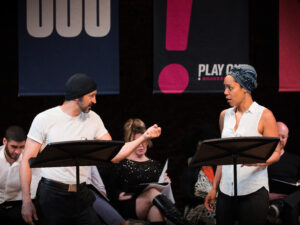
5:30 to 6:30 p.m.
Meeting
Town Hall Business Meeting
📌 Marriott 2F: Mount Hood
Open to all registrants.
Reception
Play On Reception
📌 Porter: Puddletown-Stumptown
Hosted bar and light refreshments.
7:00 to 8:30 p.m.
Annual Reception
📌 Marriott LL1: Salons EF
Hors d-oeuvres and cash bar. Open to all registrants for the Fifty-Second Annual Meeting and their guests. Each guest must have an SAA name tag in order to attend; guest tags may be requested and purchased on the conference registration form.
12 April ➤
7:30 to 8:30 a.m.
Yoga
Shakespeare Yoga
📌 Marriott 2F: Mount Hood
Anna Riehl Bertolet, RYT-200, Auburn University
Slow, meditative yin-restorative style yoga with a Shakespearean playlist. No prior yoga experience needed. Bring one-two pillows and a blanket or a towel (in lieu of a mat).
7:45 to 8:45 a.m.
Breakfast
Graduate Student Breakfast
📌 Porter: Xport Bar & Lounge
Hosted by the Trustees of the Association.
8:00 a.m. to 6:00 p.m.
Registration
📌 Marriott LL1: Registration
Book Exhibits
📌 Marriott LL2: Exhibit Hall
9:00 to 10:30 a.m.
Roundtable
In Search of Setebos: Re-staging and Re-editing The Tempest
📌 Marriott LL1: Salon E
ORGANIZERS: Matthew Dimmock, University of Sussex and Jyotsna G. Singh, Michigan State University
CHAIR: Michelle M. Dowd, University of Alabama
Matthew Dimmock, University of Sussex
Shakespeare Seeking Setebos
Sarah Dustagheer, University of Kent
The Tempest and Politics of Performance
Jyotsna G. Singh, Michigan State University
Caliban’s Dream and Prospero’s Books in The Tempest
Roundtable
Titanic Optimism: Teaching Shakespeare at Non-Elite Institutions
📌 Marriott LL1: Salon F
ORGANIZER and CHAIR: Timothy Francisco, Youngstown State University
Katherine Steele Brokaw, University of California, Merced
Shakespeare, Gen Z, and a Habitable Planet
Jeffrey Butcher, Scottsdale Community College
Finding Shakespeare in Silenced Students: First-Year Composition at the Community College
Craig Dionne, Eastern Michigan University
Humanism’s Lonely Hour: Shakespeare and the Enrollment Cliff
Kimberly A. Huth, California State University, Dominguez Hills
Shakespeare and Social Mobility: Teaching for Transformative Effect
10:30 to 11:00 a.m.
Coffee Break
📌 Marriott LL2: Exhibit Hall
11:00 a.m. to 1:00 p.m.
Seminar
Ambivalence, Part Two
📌 Porter: Stumptown
LEADERS: Frances E. Dolan, University of California, Davis and Valerie Traub, University of Michigan
As a theme, ambivalence has been central to Shakespeare studies, where it has largely been conceptualized as pertaining to individual psychic conflicts. Over the past twenty years, however, ambivalence has begun to be invoked by queers and feminists to describe an affirmative capacity, a political emotion, and structural condition of life under neo-liberalism. This seminar offers an opportunity to engage with the concept of ambivalence through this broader, more political lens.
- Patricia Badir, University of British Columbia
- Clara K. Biesel, University of Minnesota
- Simone Chess, Wayne State University
- Brent Dawson, University of Oregon
- Kyle Louise DiRoberto, University of Arizona
- Lars Engle, University of Tulsa
- Christine Hoffmann, West Virginia University
- Sawyer K. Kemp, Queens College, CUNY
- Samuel Kolodezh, University of California, San Diego
- Noémie Ndiaye, University of Chicago
- Jennifer E. Nicholson, University of Sydney
- Clifford Werier, Mount Royal University
Seminar
Early Modern Geographies of Race
📌 Marriott 2F: Hawthorne
LEADERS: Ambereen Dadabhoy, Harvey Mudd College and Debapriya Sarkar, University of Connecticut
This seminar invites scholars working at the intersections of premodern critical race studies, geography, postcolonial theory, critical indigenous studies, ecocriticism, and related fields to examine the rich and complex network of relations of race, identity, and place in early modern discourse. How were discourses of geography and place as location and social position instrumental to race-making in early modern England?
- Eric L. De Barros, American University of Sharjah
- Susan C. Frye, University of Wyoming
- Nora Galland, Université Côte d’Azur
- Yujin Jang, University of Pittsburgh
- M. Lindsay Kaplan, Georgetown University
- Chris Klippenstein, Columbia University
- Danielle Lee, SUNY College at Old Westbury
- Sarah Gray Lesley, University of Chicago
- Ali Madani, Emory University
- Nedda Mehdizadeh, University of California, Los Angeles
- Sim Ong, University of Toronto
- Goutam Piduri, Brown University
- Donovan H. Sherman, Seton Hall University
Seminar
Early Modern Horror, Part Two
📌 Marriott LL1: Medford
LEADERS: Sheila Coursey, Saint Louis University and Hannah Korell, University of Wisconsin, Platteville
This seminar invites participants to theorize “horror” as a pre-gothic genre and aesthetic in early modern literature and culture. We welcome papers that explore topics related to monsters/monstrosity, witchcraft, diabolism, true crime, public executions, or body horror. Papers might consider questions about horror and its relationship to empire and colonialism, affect or embodiment, the construction of social identity, sexuality, or shifting audience preferences within popular entertainment.
- Elizabeth Marie Dieterich, Carnegie Mellon University
- Ethan J. Guagliardo, University of British Columbia, Okanagan
- Donald Hedrick, Kansas State University
- Michael Lutz, Massachusetts Institute of Technology
- Victoria Louise McMahon
- James A. Rizzi, Canisius University
- Khristian S. Smith, University of North Carolina, Chapel Hill
- Charlotte Thurston, Graduate Center, CUNY
- Henry S. Turner, Rutgers University
- Michal Zechariah, Max Planck Institute for Human Development
Seminar
Protest and Resistance in the (Early) Modern Era
📌 Marriott LL1: Salem
LEADERS: Scott Oldenburg, Tulane University and Dyani J. Taff, Colby College
What counts as protest in the early modern period and today? Participants in this seminar will think through and broaden our sense of protest and resistance. Can protest be unintended or untheorized? What does it mean for nonhuman agents to be resistant? We are open to responses that explore multiple forms of early modern protest, that examine contemporary appropriations/adaptations that aim to resist or protest, and that reflect on resistance in the classroom or profession.
- Jahidul Alam, University of Louisiana at Lafayette
- John M. Archer, New York University
- Peter R. Cibula, University of California, Irvine
- Tracy C. Cummings, San Diego State University
- Samantha D. Dressel, Chapman University
- Hilary Jayne Gross, University of Illinois, Urbana-Champaign
- Nicholas R. Helms, Plymouth State University
- Derrick E. Higginbotham, University of Hawaiʻi, Mānoa
- Adam H. Kitzes, University of North Dakota
- Alexander Samson, University College London
- Kathryn Schubert, University of California, Irvine
- Steven Swarbrick, Baruch College, CUNY
📁 View Abstracts (forthcoming)
Seminar
Racialized Womanhood on Page, on Screen, and in Performance
📌 Marriott LL1: Portland
LEADER: Nora Galland, Université Côte d’Azur
The seminar investigates early modern representations of racialized female characters on page, on screen, and in performance. We are interested in the embodiment of gendered racial difference, the intersection between race, gender, religion, and queerness in the construction of womanhood and girlhood, and the relationship between unruly femininity, patriarchy, whiteness, and racialized womanhood.
- Hanh Bui, Shakespeare’s Globe
- Kathryn M. Corah, SUNY Albany
- Angelina Del Balzo, Bilkent University
- Rebecca Hixon, Lourdes University
- Jessica McCall, Delaware Valley University
- Harry R. McCarthy, University of Exeter
- Henriëtte Rietveld, Yale University
- Lisa S. Starks, University of South Florida
- Savannah Rae Xaver, Western Michigan University
Seminar
Reconsidering Stage Properties
📌 Porter: Pettigrove
LEADER: Douglas Clark, University of Galway
This seminar invites participants to reconsider the significance that stage properties take in shaping early modern plays and theatrical entertainments, beyond the famous crowns, skulls, rings, and letters that have most frequently drawn the attention of scholars. What more can the creation, use, and destruction of moveable objects on the stage tell us about early modern theatricality?
- Bridget B. Anderson, University of Wisconsin, Madison
- Heather A. Hirschfeld, University of Tennessee
- Genevieve Love, Colorado College
- Bernice M. Neal, York University
- David Nicol, Dalhousie University
- Emily Parise, University of California, Irvine
- Tanya Pollard, Brooklyn College, CUNY
- Andrew J. Power, University of Sharjah
- Maria Teresa Micaela Prendergast, College of Wooster
- Sydney Shamblin Anderson, University of Miami
- Simon Smith, Shakespeare Institute, University of Birmingham
- Katherine Schaap Williams, University of Toronto
Seminar
Renaissance Dick Jokes
📌 Marriott 3F: Salmon
LEADER: Jessie Hock, Vanderbilt University
Shakespeare’s sonnets exploit the many senses of his given name, Will(iam), dwelling with particular relish on its sexual meanings: penis and/or vagina. This seminar invites papers on sexual humor, especially involving name puns, in early modern literature. Papers welcome on sonnets, prose, plays, conventions of seriousness—and prudishness—in literary scholarship, intellectual traditions that inflect early modern literary sexuality (spiritualizing Neoplatonism, sensualizing materialism), interventions and new approaches in gender and sexuality studies.
- Matthew P. Harrison, West Texas A&M University
- Robert Hornback, Oglethorpe University
- Matthew Kozusko, Ursinus College
- Penelope Meyers Usher, Barnard College
- Eric D. Vivier, Mississippi State University
Seminar
(Re)Turning to the Spatial Turn in Early Modern Literature
📌 Marriott 3F: Meadowlark
LEADERS: Gavin Hollis, Hunter College, CUNY and Laura Williamson, Saint Mary’s College
The spatial turn has been with us for many decades. Has it become so enmeshed in scholarship that we now take it for granted? Can we return to the spatial? How might spatiality reinvigorate subfields which haven’t foregrounded space and place and return us to questions of, for example, conversion, race, embodiment, or translation? How does the spatial animate global and borderland Shakespeares, blue humanities, or digital humanities, even challenging our narratives of early modern spatiality?
- Jonathan Baldo Eastman, School of Music, University of Rochester
- Catherine Rose Evans, University of Manchester
- Elizabeth B. Hunter, Washington University in St. Louis
- Katherine I. Knowles, Michigan State University
- Roberta Kwan, University of Sydney; Macquarie University
- Zackariah C. Long, Ohio Wesleyan University
- Paul Whitfield White, Purdue University
Seminar
Sex, Race, and the Premodern in Popular Culture
📌 Marriott LL1: Eugene
LEADERS: Rebecca L. Fall, Newberry Library and Yasmine Hachimi, Newberry Library
From TV hits like The Serpent Queen to Beyoncé’s masterful remixes of Renaissance artwork, premodernity inspires—and premodernity sells. This seminar explores how 21st-century pop culture reimagines, adapts, and appropriates premodernity to make sense of—or control—sex and race today. How do such reimaginings reflect modern concerns about race, sexual expression, and gender identity? We envision a vibrant conversation engaging TV, film, music, video games, and other expressions of pop culture.
- Claire M. Busse, La Salle University
- Vernon G. Dickson, Florida International University
- Lee Emrich, Northeastern University
- Ryan Hackenbracht, Texas Tech University
- Jessie Herrada Nance, Columbia Gorge Community College
- Melissa M. Johnson, Texas Christian University
- Willnide Lindor, SUNY Cortland
- Danielle Rosvally, University at Buffalo, SUNY
- Laryssa Schoeck, Shakespeare Institute, University of Birmingham
- Alexandra Kathryn Sengupta, George Washington University
- David Vaughan, Northwestern Oklahoma State University
- Jennie M. Votava, Allegheny College
Seminar
Shakespeare and Ecological Crisis
📌 Marriott 2F: Belmont
LEADER: Carolyn Sale, University of Alberta
In the face of an ecological crisis of such magnitude that it is driving the extinction of non-human species and risks making Earth uninhabitable for humanity, how should we read, teach, and perform Shakespeare across the next decade? How might Shakespeare help us speak to the causes of planetary emergency, imagine a new geo-politics, and contribute to forms of action that might curtail catastrophe? How might we mobilize Shakespeare in an insurgent poetics that helps to protect life on Earth?
- Rebecca Ann Bach, University of Alabama, Birmingham
- Silvina Barna, Dominican University of California-Universidad del Salvador
- Theo Black, Cornell University
- Jean E. Feerick, John Carroll University
- Saraya Daisy-May Haddad, Shakespeare Institute, University of Birmingham
- David W. Hartwig, Weber State University
- Rebecca Lemon, University of Southern California
- Jennifer A. Munroe, University of North Carolina, Charlotte
- Kelly J. Stage, University of Nebraska, Lincoln
- Amy L. Tigner, University of Texas, Arlington
- Daniel J. Vitkus, University of California, San Diego
- Melissa E. Walter, University of Fraser Valley
Seminar
Shakespeare and Scale
📌 Marriott 2F: Laurelhurst
LEADERS: Caro Pirri, University of Pittsburgh and Jennifer Waldron, University of Pittsburgh
When the Chorus of Shakespeare’s Henry V describes actors as “ciphers” and “crooked figures” in the great “account” of history, he positions theaters as laboratories for the exploration of scale. We invite papers taking any critical approach to early modern “figures” of scale, from the theatrical and aesthetic to the epistemological and the technical. We also welcome those considering scale from methodological perspectives, such as distant/close reading or race and periodization.
- Piers Brown, Kenyon College
- Robert F. Darcy, University of Nebraska, Omaha
- Jane Hwang Degenhardt, University of Massachusetts, Amherst
- Allison K. Deutermann, Baruch College, CUNY
- Wendy Beth Hyman, Oberlin College
- Rayna Kalas, Cornell University
- James A. Knapp, Loyola University Chicago
- Alexander Paulsson Lash, National Taiwan University and Stockholm University
- Richard Preiss, University of Utah
- Anita Raychawdhuri, University of Houston, Downtown
- Adam Rzepka, Montclair State University
- Maggie Vinter, Case Western Reserve University
- Luke Wilson, Ohio State University
Seminar
Shakespeare and Sedition
📌 Porter: Bridgetown
LEADER: Joseph Mansky, University of Oklahoma
Sedition. Slander. Libel. Treason. This seminar asks: how did these and other crimes against the state shape the composition, production, and creative imagination of early modern literature? How did violence, persecution, censorship, conspiracy, xenophobia, populism, demagoguery, and other such forces interface with the literary sphere? Papers on all genres—drama, verse, prose—and from a variety of approaches (historical, theoretical, legal, political, formalist, presentist) are welcome.
- Elena Bandin, Universidad de León
- Stephanie Chamberlain, Southeast Missouri State University
- Stephen Deng, Michigan State University
- Rae’Mia Escott, Berry College
- Nathaniel C. Leonard, Westminster College, Missouri
- David Strong, University of Texas, Tyler
Seminar
Shakespeare’s Poems in Context(s)
📌 Porter: Lovejoy
LEADER: Stephen Guy-Bray, University of British Columbia
Participants are invited to discuss Shakespeare in the context of his poetry and to set his poems in dialogue with other poems, whether by his predecessors or by his contemporaries or by later writers. Participants may also wish to discuss Shakespeare’s status as a poet in critical discourse and in the teaching of poetry. All approaches are welcome.
- Mathieu D. S. Bouchard, John Abbott College
- Darlena Ciraulo, University of Central Missouri
- Jonas Gardsby, University of Wisconsin, Green Bay
- Rebeca Helfer, University of California, Irvine
- Steven Monte, College of Staten Island, CUNY
- Joseph M. Ortiz, University of Texas, El Paso
- Stephanie Pietros, College of Mount St. Vincent
- Robert Stagg, Shakespeare Institute / University of Oxford
- Kay Stanton, California State University, Fullerton
- Will Tosh, Shakespeare’s Globe
- Chloe R. Wheatley, Trinity College, Hartford
Workshop
Shakespeare Superpowers: Renaissance Scholars as Transformative Leaders
📌 Porter: Stumptown
LEADERS: Ariane M. Balizet, Texas Christian University, Natalie K. Eschenbaum, University of Washington, Tacoma, and Marcela Kostihova, Hamline University
This workshop is designed for Renaissance scholars interested in academic leadership. How does the field’s consideration of Renaissance leadership make us uniquely qualified for this work? How do we use our specific perspectives to advocate for the humanities? How do we build skills in areas required for leadership that are not part of our scholarly training? Participants will engage with common readings, reflective writings, and preparatory brainstorming prior to the SAA 2024 conference.
- Mara I. Amster, Randolph College
- Rob Conkie, University of North Carolina, Charlotte
- Alice Dailey, Villanova University
- Jennifer Feather, University of North Carolina, Greensboro
- Mark Kaethler, Medicine Hat College
- Alysia Kolentsis, St. Jerome’s University, University of Waterloo
- James Lambert, Southern Virginia University
- Katherine R. Larson, University of Toronto
- Natalie J. Loper, University of Alabama
- Allison Machlis Meyer, Seattle University
- Cassie Miura, University of Washington, Tacoma
- Marianne Montgomery, East Carolina University
- Sara Morrison, William Jewell College
- Jessica C. Murphy, University of Texas, Dallas
- Gregory M. Schnitzspahn, Fisher College
- Kathleen Kalpin Smith, University of South Carolina, Aiken
📁 View Abstracts (forthcoming)
Digital Exhibit
Linked Early Modern Drama Online (LEMDO)
📌 Marriott LL2: Exhibit Hall
EXHIBITOR: Janelle Auriol Jenstad, University of Victoria
Linked Early Modern Drama Online (LEMDO) will showcase its open-access encoding and editorial guidelines, which can be used to teach editorial praxis and text encoding. In addition, it will publicize the new website for the Queen’s Men Editions (QME), including performance editions and a new edition of Robert Greene’s Selimus.
Digital Exhibit
Play the Knave: Experimenting with Shakespeare in Mixed Reality and Virtual Reality
📌 Marriott LL2: Exhibit Hall
EXHIBITORS: Gina Bloom, University of California, Davis, Colin Milburn, University of California, Davis, and Nicholas Toothman, California State University, Bakersfield
Using a Kinect motion-sensing camera (mixed reality version) or VR headsets (virtual reality version), players use their bodies to animate avatars in a karaoke-style digital production of a Shakespeare scene. Play the Knave is a tool for teaching Shakespeare using 21st-century gaming technology and for doing research on embodied, experimental play.
Digital Exhibit
shakedsetc.org: Historic Shakespeare Editions!
📌 Marriott LL2: Exhibit Hall
EXHIBITOR: M. L. Stapleton, Purdue University, Fort Wayne
My website has been operative since 2018. I sought to design a digital library of historic editions for pursuing Shakespeare scholarship in any field. Colleagues who desired to examine the reception history of the canon from an editorial perspective could then conduct their research easily. My main goal was to make these materials accessible to anyone, a resource for everyone that could be utilized on a computer, tablet, or smartphone at the user’s convenience.
Digital Exhibit
Throughlines: Reimagining the Premodern Studies Classroom
📌 Marriott LL2: Exhibit Hall
EXHIBITORS: Taylor Flamini, Arizona State University, Leah Newsom, Arizona State University, and Laura Turchi, Arizona State University
By providing accessible and free online teaching resources for premodern critical race studies, Throughlines changes how premodern literature, history, and culture is taught. This exhibit showcases the wide range of instructional materials: lectures, exemplar syllabi, classroom activities, discussion models, and more, underdevelopment with RaceB4Race scholars.
🔗 Visit Project Website (forthcoming)
Digital Exhibit
Women’s Early Modern Letters Online (WEMLO)
📌 Marriott LL2: Exhibit Hall
EXHIBITOR: Kim R. D. McLean-Fiander, University of Victoria
Launched at Oxford in 2016, WEMLO is an SSEMWG award-winning finding aid for basic descriptions (sender, recipient, date, origin, destination, abstract, shelfmark, and repository) of women’s correspondence from the 16th-18th centuries. It currently includes 25,671 individual letter records, 2,305 letter transcriptions, and 35 individual women’s correspondence catalogues.
1:30 to 3:00 p.m.
Annual Luncheon
📌 Marriott LL1: Salons E-I
Open to all registrants for the Fifty-Second Annual Meeting. Additional guest tickets may be purchased in advance. Member tickets are included in registration envelopes (but may not be available to onsite registrants).
4:00 to 5:30 p.m.
Plenary Panel
Ecosystems of Early Modern Pedagogy
📌 Marriott LL1: Salons EF
ORGANIZER: Kristen Abbott Bennett, Framingham State University
CHAIR: Ian Smith, University of Southern California
Ian F. MacInnes, Albion College
CUREing Environmental Disaster: Early Modern Scholarly Projects for the Classroom
Jamie Paris, University of Manitoba
Becoming a Wolf: Indigenous Pedagogies and Community Resilience in Sayet’s Where We Belong
Kristen Abbott Bennett, Framingham State University
Teaching at Scale in this “Mazed World”
Liam Semler, University of Sydney
Over-Systematisation and the Humanities Classroom
6:00 to 7:00 p.m.
Reception
Scholars of Color Social
📌 Porter: Founders Ballroom
Co-sponsored by the Folger Shakespeare Library.
Hosted bar and light hors d-oevres. Open to all registrants and their guests.
7:00 to 9:00 p.m.
Performance
Matmos
📌 Marriott 2F: Mount Hood
Matmos is an experimental electronic music duo formed in San Francisco and currently based in Baltimore. M. C. (Martin) Schmidt and Drew Daniel are the core members, but they frequently include other artists on their records and in their performances, including notably J. Lesser.
7:30 to 8:30 p.m.
Performance
Loose Willis, Shakespeare Drag Cabaret
📌 Porter: Founders Ballroom
Loose Willis
Co-sponsored by Shakespeare Bulletin.
Loose Willis, a legend of the London drag and cabaret scene has been using his ample wit and more-than-ample codpiece to charm audiences with his “delicious…gender-bending” (Inverse) and “darkly hilarious” (The Stage) drag king comedy for almost a decade. However, one man in his time plays many parts and he is delighted to bring the Shakespeare Association of America, an Audience with William Shakesqueer.
9:30 to 11:30 p.m.
Reception
Asian Shakespeares Social
📌 Porter: Pendleton Patio
Hosted bar and light food. All registrants are welcome.
13 April ➤
7:30 to 8:30 a.m.
Yoga
Shakespeare Yoga
📌 Marriott 2F: Mount Hood
Kathryn Moncrief, RYT-200, Worcester Polytechnic Institute
Open to all registrants for the Fifty-Second Annual Meeting and registered guests.
8:00 a.m. to 12:00 noon
Information
📌 Marriott LL1: Registration
Book Exhibits
📌 Marriott LL2: Exhibit Hall
9:00 to 10:30 a.m.
Panel
Playing Tricks: Gender, Theatricality, and Power
📌 Marriott LL1: Salon F
ORGANIZER: Laura E. Kolb, Baruch College, CUNY
CHAIR: Vin Nardizzi, University of British Columbia
Laura E. Kolb, Baruch College, CUNY
Becoming Tricky in Shakespearean Comedy
Jessica Rosenberg, Cornell University
Falstaff’s Trick
Emily Shortslef, University of Kentucky
“A Woman’s Fraud”: Gendered Trickery in Revenge Tragedy
Panel
Reenchanting the Shakespearean Stage
📌 Marriott LL1: Salon E
ORGANIZER: Katherine Nicole Walker, University of Nevada, Las Vegas
CHAIR: Wendy Beth Hyman, Oberlin College
Mary Floyd-Wilson, University of North Carolina, Chapel Hill
The Enemy of All Unity: The Devil in Domestic Drama
Phebe Jensen, Utah State University
Astrology and Enchantment on the Early Modern Stage
Katherine Nicole Walker, University of Nevada, Las Vegas
Playing the Conjuror: The Trickster Magician
9:00 a.m. to 12:00 noon
Workshop for Teachers
How to Use Gaming Technology in the Classroom to Make Shakespeare Topical, Relatable, and Approachable
📌 Marriott 2F: Mount Hood
Gina Bloom, University of California, Davis
 This workshop shows how to use a free digital theatre game called Play the Knave to motivate learners. Students read Shakespeare’s texts karaoke-style while a motion-capture camera lets them control their avatars’ movements on a virtual stage. Participating teachers have the option to receive one Continuing Education Unit (CEU) from the University of California, Davis. Click here for more information. Register at https://miniurl.pro/shakespeare or by scanning the QR code.
This workshop shows how to use a free digital theatre game called Play the Knave to motivate learners. Students read Shakespeare’s texts karaoke-style while a motion-capture camera lets them control their avatars’ movements on a virtual stage. Participating teachers have the option to receive one Continuing Education Unit (CEU) from the University of California, Davis. Click here for more information. Register at https://miniurl.pro/shakespeare or by scanning the QR code.
10:30 to 11:00 a.m.
Coffee Break
📌 Marriott LL1: Ballroom Foyer
11:00 a.m. to 12:30 p.m.
Plenary Panel
NextGenPlen
📌 Marriott LL1: Salon E
ORGANIZERS: Members of the NextGenPlen Committee
CHAIR: Bernadette Andrea, University of California, Santa Barbara
Erika Lyn Carbonara, Wayne State University
Cuckold Communities in the Kinky Early Modern
Margaux Delaney, Cornell University
Three Copies of Ovid’s Metamorphoses
Lily Freeman-Jones, Queen Mary University of London
Skin Coats and the Texture of Race in Early Stuart Masques
Arya Sureshbabu, University of California, Berkeley
Cleopatra’s “Immoment Toys”
2:00 to 3:30 p.m.
Roundtable
In Plain Sight: Whiteness in Shakespeare Studies
📌 Marriott LL1: Salon E
ORGANIZER: David Sterling Brown, Trinity College
INTERLOCUTOR: Dympna C. Callaghan, Syracuse University
David Sterling Brown, Trinity College
Shakespeare White Others
Katherine A. Gillen, Texas A&M University, San Antonio
Shakespeare’s Racial Classicism: Whiteness, Slavery, and Humanism
Arthur L. Little, Jr., University of California, Los Angeles
White People in Shakespeare: Essays on Race, Culture and the Elite
Panel
Shakespearean Theatre of Recovery and Liberation: Contesting Domination on the Modern American Stage
📌 Marriott LL1: Salon F
ORGANIZERS: Vanessa I. Corredera, Andrews University and Kathryn V. Santos, Trinity University
CHAIR: Ruben Espinosa, Arizona State University
Vanessa I. Corredera, Andrews University
Coalitions of Revolution and Resistance: The Disruptive Charge of Henry Godinez’s Measure for Measure
Joyce Green MacDonald, University of Kentucky
Black Magician: Danai Gurira’s Richard III
Kathryn V. Santos, Trinity University
Performing Archives of Resistance
4:00 to 6:00 p.m.
Seminar
The Sensorium of Early Modern Science
📌 Marriott LL1: Eugene
LEADER: Whitney Sperrazza, Rochester Institute of Technology
The five senses were significant epistemological tools in early modern England, from the hands-on work of midwifery to the “sound-houses” of Bacon’s New Atlantis to the burgeoning popularity of the curiosity cabinet, a sensory-rich colonial tool. This seminar invites us to center the sensorium in our studies of premodern science. Papers might examine the senses as conceptual fields, prosthetic sensory tools of early science, or sense-thinking at the intersections of literature and science.
- Pavneet S. Aulakh, Vanderbilt University
- Courtney Cahalan, University of California, Davis
- Joan Fitzpatrick, Loughborough University
- Jennifer Forsyth, Kutztown University
- Ashley Howard, University of British Columbia
- Tamara Mahadin, Ohio State University
- Dorothy Todd, Texas A&M University
- Natalia S. Zelezinskaya, Belarusian State University
📁 View Abstracts (forthcoming)
Seminar
Shakespeare and Textual Failure
📌 Marriott LL1: Salon A
LEADER: Claire M. L. Bourne, Pennsylvania State University
This seminar invites papers on any aspect of textual failure vis-à-vis Shakespeare and early modern texts, including but not limited to: mistakes and errors; loss and destruction; misreadings; digital glitches; forgotten cues/lines in performance; flaws in editorial design; unsolvable textual cruxes; un- or underfunded editorial projects; texts contingent on the personal/financial/professional precarity of their makers; inscrutable marginalia; textual rejection (in critical circles, by the mainstream, etc.)
- Charles Nathaniel Bell, University of Alabama
- Patrick Durdel, Université de Lausanne
- Andrew J. Fleck, University of Texas, El Paso
- Philip Austin Gilreath, Northeastern University
- Lara D. Hansen-Morse, University of Nevada, Reno
- Janelle Auriol Jenstad, University of Victoria
- Jeffrey Masten, Northwestern University
- David McInnis, University of Melbourne
- Devani Singh, Université de Genève
- Denise A. Walen, Vassar College
- Thomas Ward, United States Naval Academy
- Breanne Weber, University of Virginia
- Molly G. Yarn, Athens, GA
- Adam Zucker, University of Massachusetts, Amherst
Seminar
Shakespeare and Voice
📌 Marriott LL1: Salon B
LEADERS: Katie Adkison, Bates College and Kent Lehnhof, Chapman University
This seminar focuses on the role and operation of the voice in the works of Shakespeare and his contemporaries. We invite participants to examine what voices do, who gets to use them, and what they make (im)possible. We are especially interested in papers that focus on the voice as a sensuous, embodied, material, and acoustic phenomenon, and not just as a vehicle for the expression of semantic content. Collectively, we seek new ways of listening to and for the vocality of Shakespeare’s world.
- Jennifer Black, Boise State University
- Sheila T. Cavanagh, Emory University
- Darlene Farabee, University of South Dakota
- Pierre Hecker, Carleton College
- Sylvia Chi-hua Korman, Graduate Center, CUNY
- Sean K. Lawrence, University of British Columbia, Okanagan
- Ian Munro, University of California, Irvine
- Robert B. Pierce, Oberlin College retired
- Amanda K. Ruud, Valparaiso University
- Stephanie Shirilan, Syracuse University
- Megan Snell, Wells College
- Suzanne Tanner, University of Kansas
- David Higbee Williams, University of Michigan
📁 View Abstracts (forthcoming)
Seminar
Shakespearean Natures
📌 Marriott LL1: Salon C
LEADERS: Gretchen E. Minton, Montana State University and Peter C. Remien, Lewis-Clark State College
To what extent is Shakespeare (in Johnson’s formulation) a poet of nature? Sponsored by the Oecologies Research Cluster, this seminar welcomes papers of a variety of approaches and critical orientations centered on Shakespearean nature. Construing nature as both concept and material entity, constitutive of theology and science, and subject to myriad cultural and historical permutations, the seminar seeks to revitalize a longstanding line of inquiry through emergent questions and methodologies.
- Erin Ellerbeck, University of Victoria
- Claire Hansen, Australian National University
- Erin K. Kelly, California State University, Chico
- Randall Martin, University of New Brunswick
- Thomas J. Moretti, Iona University
- Shaun Nowicki, University of California, Santa Barbara
- Holly C. Pickett, Washington and Lee University
- Mikhaila Redovian, University of California, Davis
- Kirsten Schuhmacher, University of California, Davis
- Susan C. Staub, Appalachian State University
- Barbara Taylor, Australian National University
Seminar
“Shakespheres”: Cross-Media and Non-Anglophone Shakespeare in Contemporary Times
📌 Marriott LL1: Salon G
LEADERS: Ivy Hao Liu, Tsinghua University and Cun Xie, Beijing Foreign Studies University
Now more than ever, Shakespeare is both globally mobile and locally inflected. A diversity of cultural and political contexts have reshaped our understanding of the Bard. This seminar welcomes non-Anglophone and cross-media perspectives on Shakespeare’s works as well as reflections on the uses of “Shakespeare” as a global icon of cultural and literary value. We will delve into the intricate ways in which the local contexts and indigenous traditions are reshaping our understanding of the Shakespeare canon, and explore the protean meanings of “Shakespeare” in our increasingly interconnected, digital, and multimedia age.
- Rebekah Bale, Hong Kong Shue Yan University
- Anston Bosman, Amherst College
- King-Kok Cheung, University of California, Los Angeles
- Emma Elizabeth de Beus, Queen’s University Belfast
- Marinela Golemi, Northern Arizona University
- Amir Khan, Hunan Normal University
- Jun Li, University of International Business and Economics
- Alfredo Michel Modenessi, Universidad Nacional Autónoma de México
- Laina Southgate, University of Toronto
- Donna Woodford-Gormley, New Mexico Highlands University
Seminar
Theatre History Now—Sites and Insights
📌 Marriott LL1: Salon D
LEADERS: Laurie Johnson, University of Southern Queensland and Siobhan C. Keenan, De Montfort University
This seminar invites reflection on the sites of 21st-century theatre history, both in terms of the places we study and the places in which (and the positions from which) we study. What new insights can theatre history offer into the physical spaces, proximities, distances, and sites of early theatre? How might new developments in theatre history inform new methodologies covering the role, use and accessibility of archival materials and archaeological sites?
- Douglas H. Arrell, University of Winnipeg
- Benjamin Blyth, University of Calgary
- Meryl Anne Faiers, Shakespeare Institute, University of Birmingham
- Louise Geddes, Adelphi University
- Eva Griffith, London, UK
- Tracey Hill, Bath Spa University
- Lucy Alice Holehouse, University of Birmingham
- David Kathman, Chicago, IL
- Sally-Beth MacLean, University of Toronto
- Clare McManus, Northumbria University
- Lucy Munro, King’s College London
- Kara J. Northway, Kansas State University
- Gerit Quealy, New York, NY
- Héloïse Sénéchal, Shakespeare Institute, University of Birmingham
- Elizabeth E. Tavares, University of Alabama
- W. B. Worthen, Barnard College, Columbia University
Seminar
Trans/Philologies
📌 Marriott 2F: Belmont
LEADER: Joseph Gamble, University of Toledo
This seminar aims to bring together the questions and concerns of philology and trans studies, both defined in their broadest terms. Questions to be considered include: how might philological methods give us purchase on the epistemological contours of gender nonconformity in early modernity? What might the materiality of texts have to teach us about the materiality of bodies? How might intersectional approaches to gender, race, sexuality, disability, and class revivify philological methods?
- Gabriel Bloomfield, United States Naval Academy
- Drew Daniel, Johns Hopkins University
- Mario DiGangi, Graduate Center, CUNY
- Sandra M. Goldstein Lehnert, Graduate Center, CUNY
- Natasha Korda, Wesleyan University
- James Yukiko Mulder, Bentley University
- Marjorie Rubright, University of Massachusetts, Amherst
- Scott A. Trudell, University of Maryland
Seminar
Travel and Rhetoric in Early Modern Literature
📌 Marriott 2F: Hawthorne
LEADER: Natalya Din-Kariuki, University of Warwick
This seminar will reflect on the connections between travel and rhetoric in any aspect of early modern literature. Papers could consider the uses of rhetoric in travel writing or the entanglement of travel and rhetoric in any other context, such as voyage drama. They might deal with questions of race, gender, sexuality, and disability; the archive; material culture, and more, and take stock of the interpretation of travel and rhetoric in existing scholarship while developing new approaches.
- Katherine Blankenau, Mount Marty University
- James H. Seth, Central Washington University
Workshop
Using Shakespeare in a Time of Political Backlash
📌 Marriott LL1: Portland
LEADERS: Jennifer A. Low, Florida Atlantic University, Ian F. Moulton, Arizona State University, and Gary L. Taylor, Florida State University
Responding to political backlash against an inclusive curriculum, we will develop strategies to create and expand spaces for teaching socially active curricula, and strengthen the right to faculty governance. Grounding our discussion in concrete knowledge of recent legislation, we will cultivate our expertise in rhetorical techniques, including invoking the aura of Shakespeare, to reframe and challenge conservative positions. We’ll also develop vocabularies that comply with legislation while enabling us to continue our work with students.
- Emma K. Atwood, University of Montevallo
- Mark Bayer, University of Texas, San Antonio
- Valerie Billing, Central College
- W. Scott Howard, University of Denver
- Rebecca M. Quoss-Moore, University of Central Oklahoma
- Tyler Sasser, University of Alabama
- James Sutton, Florida International University
- Deborah Uman, Weber State University
Seminar
Vigilance and Epistemological Uncertainty in Early Modern Drama
📌 Marriott 3F: Salmon
LEADERS: Cord-Christian Casper, Ludwig-Maximilians-Universität München, Nikolina Hatton, Ludwig-Maximilians-Universität München, and Claudia Olk, Ludwig-Maximilians-Universität München
What is unknown on the early modern stage? This seminar explores unknowingness as a constitutive dimension of dramatic texts and theatrical practice. What kinds of vigilance are required once a form of knowing becomes suspect? How does theater thrust the audience into states of discrepant awareness that demand vigilance? Participants will explore how drama probes cultural practices of vigilance in the face of doubt, skepticism, and reasoned mistrust.
- Naomi C. Liebler, Montclair State University
- Caroline Lion, The New Swan Theater, University of California, Irvine
- Subha Mukherji, University of Cambridge
- Shankar Raman, Massachusetts Institute of Technology
- Freya Sierhuis, University of York
- Michael M. Wagoner, United States Naval Academy
- Matthew Walsh, University of Massachusetts, Amherst
Seminar
Whither Memorial Reconstruction?
📌 Marriott LL1: Medford
LEADERS: Alan B. Farmer, Ohio State University and Sarah Neville, Ohio State University
This seminar reconsiders the theory of memorial reconstruction. Although it is usually invoked to explain “corrupt” textual evidence, recent quantitative and qualitative methods of studying authorship, book history, and dramaturgy offer alternative explanations. How might new methods support or argue against the possibility of MR? Papers on textual transmission, the history and practice of scholarly editing, and the connections between bibliography and performance are particularly welcome.
- Terri Bourus, Florida State University
- Joshua R. Held, Southeastern Oklahoma State University
- Peter Holland, University of Notre Dame
- Mark C. Hulse, Jackson College
- Charles Adams Kelly, University of Michigan
- Laurie E. Maguire, University of Oxford
- Steven Urkowitz, City College of New York, CUNY
- Paul Werstine, King’s University College, Western
- Daniel Yabut, CNRS/Université Paul-Valéry Montpellier III
Seminar
Women Playmakers
📌 Marriott LL1: Salem
LEADER: Elizabeth Zeman Kolkovich, Ohio State University
What does it mean to “make” a play, and who does so? How have women helped produce early modern drama? This seminar invites a wide range of approaches to these questions, along with many definitions of “women,” “maker,” and “play.” Research on individual playwrights, translators, performers, patrons, printers, publishers, scribes, directors, and other devisers is welcome, as are considerations of gender in theatrical production at any historical moment, papers on modern adaptations of early modern drama, and transhistorical studies.
- Jennifer Birkett, University of Notre Dame
- Stephen Cohen, Central Connecticut State University
- Anna Susan Graham, Dublin, Ireland
- Eve Houghton, Yale University
- Jordan Ivie, Vanderbilt University
- Grace Kimball, University of California, Santa Barbara
- Katharine E. Landers, Illinois State University
- Emer McHugh, Queen’s University Belfast
- Katie Elizabeth O’Hare, University of California, Santa Cruz
- Ann Pleiss Morris, Ripon College
- Martine Van Elk, California State University, Long Beach
- Valerie Voight, University of Tennessee
Seminar
Writing Like Shakespeare: Invention, Appropriation, and Pastiche from the 1590s to the 2020s
📌 Marriott LL1: Salon H
LEADERS: Nick Moschovakis, Bethesda, MD and Jennifer L. Wood, Folger Shakespeare Library
This seminar will convene scholars and eminent creative practitioners to consider the past and present of Shakespearean mimicries and mashups. How have writings succeeded, or failed, at recreating textual and theatrical features deemed typically Shakespearean? Topics may include plays in pointedly Shakespearean idioms; parody and bricolage, whether serious or burlesque (or both); and simulations of Shakespearean writing generated by artificial intelligence using language models (e.g., ChatGPT).
- Jenny L. Andersen, California State University, San Bernardino
- Jonathan Burton, Whittier College
- Lezlie C. Cross, University of Portland
- Kirk Dodd, University of Sydney
- Ian Doescher, Portland, OR
- Patricia Lynne Gillies, University of Essex
- Musa Gurnis, Baruch College/Red Bull Theater
- Ronan James Hatfull, University of Warwick / NYU London
- Joseph P. Haughey, Northwest Missouri State University
- Gary Kuchar, University of Victoria
- Scott Maisano, University of Massachusetts Boston
- Kevin A. Quarmby, College of St. Scholastica
- Bryan Reynolds, University of California, Irvine
- Dustin Stegner, California State Polytechnic University, San Luis Obispo
- Laura Turchi, Arizona State University
- William N. West, Northwestern University
6:15 to 8:15 p.m.
Cash Bar
ACMRS Cash Bar
📌 Marriott LL1: Ballroom Foyer
Sponsored by ACMRS.
Celebrating authors and contributors to new ACMRS titles. All members are welcome.
7:00 to 9:00 p.m.
Performance
The Rape of Lucrece and Early Modern Rape Culture: A Performance and Discussion
📌 Marriott LL1: Salon I
David J. Schalkwyk, Queen Mary University of London
Elena Pellone, Shakespeare Institute, University of Birmingham
Elena Pellone will present a dramatic performance of Shakespeare’s moving and harrowing poem, The Rape of Lucrece, with musical accompaniment by Katherine Abbott. Pellone’s performance was presented at the 2021 inaugural Verona Shakespeare Fringe Festival and the Shakespeare’s Coming Home! Festival, Stratford-upon-Avon, in 2022. A discussion of the performance and the poem will follow, moderated by event organizer David Schalkwyk.
10:00 p.m. to 1:00 a.m.
Dance
The Malone Society Dance
📌 Marriott LL1: Salon E
This year, the dance is free to all registrants and their guests thanks to the generosity of the Malone Society.
The Malone Society invites all registrants of #Shax2024 to join the dance and join its ranks: malonesociety.com. The Malone Society publishes editions of early printed and manuscript texts of plays, plus collections of documentary material relating to the performance and reception of early drama.
Practicum
Articles in Progress
Louise Geddes, Adelphi UniversityThe practicum supports first time authors preparing their articles for submission to academic journals. Authors will submit an abstract and brief biography and be paired with a senior scholar with editorial expertise who will read a draft of the article and offer feedback at an informal meeting during the conference.
Cambridge University Press and the Digital: Drinks Reception
Visit the Cambridge University Press stand to hear about digital initiatives over refreshments. Meet the Elements series editors, sign up for a free trial of the Cambridge Shakespeare platform, and pose your questions!

🔗 digitaltheatreplus.com
✉️ sales@digitaltheatre.com
Jimmie A. Moglia
The Malone Society invites all registrants of #Shax2024 to join its ranks!
The Malone Society publishes editions of early printed and manuscript texts of plays, plus collections of documentary material relating to the performance and reception of early drama. In addition to the annual volumes distributed to members, we support scholarship through fellowships and research grants, prizes, symposia and a range of bibliographically inspired t-shirts.
New members receive a copy of the current annual volume and a volume from our backlist of their choice, and new student members receive three free volumes from the backlist. Membership is available for purchase in a variety of currencies, and we offer discounted membership rates to students and scholars who are precariously, contingently, or independently employed. Our current annual volume is William Percy’s The Aphrodysial, ed. by Maria Shmygol.
To join the society, please go to our website: malonesociety.com.

The School of Writing, Literature, and Film
Oregon Humanities Center’s Endowment for Public Outreach in the Arts, Sciences, and Humanities
Weatherhead Endowment for the Undergraduate Study of Shakespeare and Department of English
Department of English
Portland Marriott Downtown Waterfront
3rd Floor (Marriott 3F)
2nd Floor (Marriott 2F)
Main Lobby (Marriott L)
Lower Level 1 (Marriott LL1)
Lower Level 2 (Marriott LL2)
The Porter Portland, Curio Collection by Hilton
Participants of the 52nd Annual Meeting
A
Brandi K. Adams, Arizona State University
Mary Adams, Western Carolina University
Katie Adkison, Bates College
Ruben Adorno, Digital Theatre+
Patricia Akhimie, Folger Shakespeare Library
Jahidul Alam, University of Louisiana at Lafayette
Michael Andrew Albright, Southwest Minnesota State University
Lucie I. Alden, University of Virginia
Cristina León Alfar, Hunter College, CUNY
Miranda Alksnis, University of Wisconsin, Madison
Mara I. Amster, Randolph College
Jenny L. Andersen, California State University, San Bernardino
Bridget B. Anderson, University of Wisconsin, Madison
Susan L. Anderson, Staunton, VA
Bernadette Andrea, University of California, Santa Barbara
Ronda Arab, Simon Fraser University
John M. Archer, New York University
Lukas Arnold, Universität Zürich
Douglas H. Arrell, University of Winnipeg
Charlotte Artese, Agnes Scott College
Abdulhamit Arvas, University of Pennsylvania
Amanda B. Atkinson, Southern Methodist University
Katherine B. Attié, Towson University
Emma K. Atwood, University of Montevallo
Pavneet S. Aulakh, Vanderbilt University
M. G. Aune, Pennsylvania Western University of Pennsylvania
B
Rebecca Ann Bach, University of Alabama, Birmingham
Hailey Bachrach, University of Roehampton
Patricia Badir, University of British Columbia
Amanda Bailey, University of Maryland
Jonathan Baldo, Eastman School of Music, University of Rochester
Rebekah Bale, Hong Kong Shue Yan University
Ariane M. Balizet, Texas Christian University
Elena Bandin, Universidad de León
Roberta Barker, Dalhousie University
Linnea Barklund, Portland, OR
Lisa M. Barksdale-Shaw, Arizona State University
Silvina Barna, Dominican University of California-Universidad del Salvador
Chris Barrett, Louisiana State University
Andie Barrow, University of Wisconsin, Madison
Andreas Patrick Bassett, University of Washington
Shaul Bassi, Università Ca’ Foscari Venezia
Robin Bates, University of Lynchburg
Mark Bayer, University of Texas, San Antonio
Meredith Beales, University of British Columbia
Jessica Beckman, Dartmouth College
Charles Nathaniel Bell, University of Alabama
James Bell, Oak Park, IL
Nicholas Bellinson, St. John’s College, Annapolis
Frederick Bengtsson, University of Kentucky
Kristen Abbott Bennett, Framingham State University
Sean M. Benson, University of Mary Hardin-Baylor
Anna Riehl Bertolet, Auburn University
Royce Best, Rochester Institute of Technology
Clara K. Biesel, University of Minnesota
Valerie Billing, Central College
Jennifer Birkett, University of Notre Dame
Sarah A. Bischoff, University of California, Los Angeles
Jennifer Black, Boise State University
Joseph Black, University of Massachusetts, Amherst
Theo Black, Cornell University
Marlin E. Blaine, California State University, Fullerton
Katherine Blankenau, Mount Marty University
Gina Bloom, University of California, Davis
Gabriel Bloomfield, United States Naval Academy
Benjamin Blyth, University of Calgary
Erika M. Boeckeler, Northeastern University
Lucy Ann Boon, Australian National University
Todd A. Borlik, University of Huddersfield
Joyce Boro, Université de Montréal
Anston Bosman, Amherst College
Keith M. Botelho, Kennesaw State University
Mathieu D. S. Bouchard, John Abbott College
Claire M. L. Bourne, Pennsylvania State University
Terri Bourus, Florida State University
Lara Bovilsky, University of Oregon
Andrew Bozio, Skidmore College
Beatrice Bradley, Muhlenberg College
Hes Bradley, University of Birmingham
Heidi Brayman, University of California, Riverside
Hannah M. Bredar, University of Michigan
Katherine Steele Brokaw, University of California, Merced
James M. Bromley, Miami University
Chloe Brooke, Wayland Baptist University
David Sterling Brown, Trinity College
Piers Brown, Kenyon College
Emily D. Bryan, Sacred Heart University
Thea Buckley, Queen’s University Belfast
Paul Budra, Simon Fraser University
Stephen M. Buhler, University of Nebraska, Lincoln
Hanh Bui, Shakespeare’s Globe
Mattie Burkert, University of Oregon
Mark Thornton Burnett, Queen’s University Belfast
Virginia M. Burnett, Universidad de Puerto Rico
Elizabeth Burow-Flak, Valparaiso University
Jonathan Burton, Whittier College
Rebecca Bushnell, University of Pennsylvania
Claire M. Busse, La Salle University
Jeffrey Butcher, Scottsdale Community College
C
Courtney Cahalan, University of California, Davis
Ofir I. Cahalan, University of California, Davis
Dympna C. Callaghan, Syracuse University
John H. Cameron, St. Mary’s University
Ryan Campagna, University of Chicago
Joseph Campana, Rice University
Erika Lyn Carbonara, Wayne State University
Rob Carson, Hobart and William Smith Colleges
Matthew Charles Carter, Clayton State University
Jim Casey, Tyler, TX
Cord-Christian Casper, Ludwig-Maximilians-Universität München
Sheila T. Cavanagh, Emory University
Juan F. Cerdá, Universidad de Murcia
Urvashi Chakravarty, University of Toronto
Darryl Chalk, University of Southern Queensland
Stephanie Chamberlain, Southeast Missouri State University
Hannah N. Chambers, Emory University
Simone Chess, Wayne State University
King-Kok Cheung, University of California, Los Angeles
Jessica K. Chiba, Shakespeare Institute, University of Birmingham
Margaret Christian, Pennsylvania State University, Lehigh Valley
Brandon Christopher, University of Winnipeg
Peter R. Cibula, University of California, Irvine
Darlena Ciraulo, University of Central Missouri
Douglas Clark, University of Galway
Judith P. Clark, Stephens College
Catherine R. Clifford, Hastings College
Stephen Cohen, Central Connecticut State University
Walter I. Cohen, University of Michigan
Jason Comerford, Shakespeare at Notre Dame
Rob Conkie, University of North Carolina, Charlotte
Kenneth Connally, University of California, Davis
Francis X. Connor, Wichita State University
Kathryn M. Corah, SUNY Albany
Rocio Corral Garcia, Cornell University
Vanessa I. Corredera, Andrews University
Mayra A. Cortes, University of California, San Diego
Sheila Coursey, Saint Louis University
Heidi Craig, University of Toronto
Lezlie C. Cross, University of Portland
Melissa Croteau, California Baptist University
Kaitlyn Culliton, Texas A&M International University
Tracy C. Cummings, San Diego State University
Karen Cunningham, University of California, Los Angeles
D
Thomas W. Dabbs, Aoyama Gakuin University
Ambereen Dadabhoy, Harvey Mudd College
Alice Dailey, Villanova University
Liam Thomas Daley, University of Maryland
Drew Daniel, Johns Hopkins University
Drew Daniel, Johns Hopkins University
Robert F. Darcy, University of Nebraska, Omaha
Deyasini Dasgupta, Syracuse University
Jim Dassise, The Scholar’s Choice
Kurt Daw, San Francisco State University
Claire Dawkins, Stanford University Online High School
Brent Dawson, University of Oregon
Eric L. De Barros, American University of Sharjah
Emma Elizabeth de Beus, Queen’s University Belfast
Jane Hwang Degenhardt, University of Massachusetts, Amherst
Angelina Del Balzo, Bilkent University
Margaux Delaney, Cornell University
Stephen Deng, Michigan State University
Allison K. Deutermann, Baruch College, CUNY
Amanda Di Ponio, Huron University College
Vernon G. Dickson, Florida International University
Elizabeth Marie Dieterich, Carnegie Mellon University
Mario DiGangi, Graduate Center, CUNY
Adrienne Janine Dillard, Eastern Washington University
Matthew Dimmock, University of Sussex
Natalya Din-Kariuki, University of Warwick
Craig Dionne, Eastern Michigan University
Kyle Louise DiRoberto, University of Arizona
Kirk Dodd, University of Sydney
Joel M. Dodson, Southern Connecticut State University
Ian Doescher, Portland, OR
Frances E. Dolan, University of California, Davis
Lue Douthit, Play On Shakespeare
Michelle M. Dowd, University of Alabama
Samantha D. Dressel, Chapman University
Jennifer Drouin, McGill University
Mark Dudgeon, The Arden Shakespeare
Timothy J. Duggan, Northeastern Illinois University
Delanie R. Harrington Dummit, University of California, Davis
Méline Dumot, UCA, Clermont Ferrand
Eric Dunnum, Campbell University
Tyler David Dunston, University of Michigan
Kelly A. Duquette, Georgia Institute of Technology
Patrick Durdel, Université de Lausanne
Sarah Dustagheer, University of Kent
E
Claire J. Eager, College of Wooster
Julie Ann Eckerle, University of Minnesota, Morris
Hillary Eklund, Loyola University New Orleans
Nour El Gazzaz, American University in Dubai
Erin Ellerbeck, University of Victoria
Lee Emrich, Northeastern University
Lars Engle, University of Tulsa
Natalie K. Eschenbaum, University of Washington, Tacoma
Rae’Mia Escott, Berry College
Doug Eskew, Colorado State University, Pueblo
Ruben Espinosa, Arizona State University
Catherine Rose Evans, University of Manchester
Kasey Evans, Northwestern University
Donna Even-Kesef, Stanford University
F
Meryl Anne Faiers, Shakespeare Institute, University of Birmingham
Rebecca L. Fall, Newberry Library
Darlene Farabee, University of South Dakota
Alan B. Farmer, Ohio State University
Valerie M. Fazel, Arizona State University
Jennifer Feather, University of North Carolina, Greensboro
Jean E. Feerick, John Carroll University
Margaret W. Ferguson, University of California, Davis
Melody Fetske, Shakespeare Association of America
Gina Filo, Southeastern Louisiana University
Joan Fitzpatrick, Loughborough University
Jennifer Flaherty, Georgia College
Taylor Flamini, Arizona State University
Andrew J. Fleck, University of Texas, El Paso
Diego Gregorio Fleitas, University of Mississippi
Mary Floyd-Wilson, University of North Carolina, Chapel Hill
Gregory A. Foran, Nazareth University
Jennifer Forsyth, Kutztown University
Liz Fox, University of Massachusetts, Amherst
Megan E. Fox, University of Wisconsin, Madison
Theo Fox, York University
Timothy Francisco, Youngstown State University
Malcolm B. Fredeking, Portland, OR
Anne Freeman, University of Mississippi
Sonya Freeman Loftis, Morehouse College
Lily Freeman-Jones, Queen Mary University of London
Michael D. Friedman, University of Scranton
Susan C. Frye, University of Wyoming
Barbara Fuchs, University of California, Los Angeles
G
Evelyn Gajowski, University of Nevada, Las Vegas
Mariam Galarrita, Arizona State University
Nora Galland, Université Côte d’Azur
Joseph Gamble, University of Toledo
Jonas Gardsby, University of Wisconsin, Green Bay
John S. Garrison, Los Angeles, CA
Kim Gauthier, Université du Québec à Montréal
Louise Geddes, Adelphi University
Benjamin C. Gee, Stanford University
Penelope H. Geng, Macalester College
Emily C. George, University of Washington and South Seattle College
Loreen L. Giese, Ohio University
Edward Gieskes, University of South Carolina
Katherine A. Gillen, Texas A&M University, San Antonio
John D. Gillies, University of Essex
Patricia Lynne Gillies, University of Essex
Philip Austin Gilreath, Northeastern University
Emily Glider, Yale University
Emma Goff-Leggett, Cambridge University Press
David B. Goldstein, York University
Sandra M. Goldstein Lehnert, Graduate Center, CUNY
Marinela Golemi, Northern Arizona University
Ani Govjian, Los Angeles, CA
Kyle Grady, University of California, Irvine
Anna Susan Graham, Dublin, Ireland
Kenneth J. Graham, University of Waterloo
E. Rose Grant, University of Toronto
Jessica H. Gray, University of California, Davis
Douglas E. Green, Augsburg University
Miles P. Grier, Queens College, CUNY
Andrew Griffin, University of California, Santa Barbara
Eric J. Griffin, Millsaps College
Eva Griffith, London, UK
Jade Grogan, The Arden Shakespeare
Hilary Jayne Gross, University of Illinois, Urbana-Champaign
Johnina Grozav, Moreno Valley College
Sarah Grunnah, Weber State University
Ethan J. Guagliardo, University of British Columbia, Okanagan
Musa Gurnis, Baruch College/Red Bull Theater
Emiliano Gutierrez-Popoca, Georgia Institute of Technology
Stephen Guy-Bray, University of British Columbia
H
Yasmine Hachimi, Newberry Library
Ryan Hackenbracht, Texas Tech University
Saraya Daisy-May Haddad, Shakespeare Institute, University of Birmingham
Nicole Hagstrom-Schmidt, Texas A&M University
Jess Hamlet, Alvernia University
William M. Hamlin, Washington State University
Yehrim Han, Korea National Open University
Molly Hand, Florida State University
Claire Hansen, Australian National University
Lara D. Hansen-Morse, University of Nevada, Reno
Tianhu Hao, Zhejiang University / Harvard-Yenching Institute
Taylor Hare, Pennsylvania State University
Matthew P. Harrison, West Texas A&M University
David W. Hartwig, Weber State University
Ronan Hatfull, University of Warwick / NYU London
Nikolina Hatton, Ludwig-Maximilians-Universität München
Joseph P. Haughey, Northwest Missouri State University
Ella Kirsty Hawkins, Royal Welsh College of Music and Drama
Pierre Hecker, Carleton College
Donald Hedrick, Kansas State University
Megan Heffernan, DePaul University
Anna Hegland, Carthage College
Joshua R. Held, Southeastern Oklahoma State University
Rebeca Helfer, University of California, Irvine
Nicholas R. Helms, Plymouth State University
Diana E. Henderson, Massachusetts Institute of Technology
Olivia Henderson, University of California, Santa Barbara
Trish Thomas Henley, Seattle University
Kelly Herman, California State University, Dominguez Hills
Jessie Herrada Nance, Columbia Gorge Community College
David Hershinow, Graduate Center, CUNY
Derrick E. Higginbotham, University of Hawaiʻi, Mānoa
Jennifer Higginbotham, Ohio State University
Ben David Robert Higgins, University of Oxford
John C. Higgins, Case Western Reserve University
Benjamin Hilb, Francis Marion University
Tracey Hill, Bath Spa University
Michael J. Hirrel, Arlington, VA
Heather A. Hirschfeld, University of Tennessee
Rebecca Hixon, Lourdes University
Jessie Hock, Vanderbilt University
Christine Hoffmann, West Virginia University
Lucy Alice Holehouse, University of Birmingham
Jennifer R. Holl, Rhode Island College
Peter Holland, University of Notre Dame
Gavin Hollis, Hunter College, CUNY
Adam G. Hooks, University of Iowa
D. J. Hopkins, San Diego State University
Jackie Hopkins
Robert Hornback, Oglethorpe University
Patrick Horton-Wright, Oxford University Press
Eve Houghton, Yale University
Michelle Houston, Manchester University Press
Ashley Howard, University of British Columbia
Jean Elizabeth Howard, Columbia University
W. Scott Howard, University of Denver
Adrian Howe, University of Melbourne
Joanna Huh, University of Cincinnati
Mark C. Hulse, Jackson College
Marvin W. Hunt, North Carolina State University
Elizabeth B. Hunter, Washington University in St. Louis
Kimberly A. Huth, California State University, Dominguez Hills
Hyosik Hwang, Chungbuk National University
Wendy Beth Hyman, Oberlin College
I
Jordan Ivie, Vanderbilt University
J
Nicole A. Jacobs, California Polytechnic State University
Miriam E. Jacobson, University of Georgia
Yujin Jang, University of Pittsburgh
Nicholas James Jaroma, University of New Hampshire
Benjamin Jeffery, University of Chicago
Liesl Elphie Jensen, Shakespeare Institute, University of Birmingham
Phebe Jensen, Utah State University
Savannah Jensen, University of South Florida
Janelle Auriol Jenstad, University of Victoria
Eric M. Johnson, George Mason University
Laurie Johnson, University of Southern Queensland
Melissa M. Johnson, Texas Christian University
Sarah E. Johnson, Royal Military College of Canada
Emily G. Jones, University of South Florida
Alexa Alice Joubin, George Washington University
K
Yunah Kae, College of Charleston
Mark Kaethler, Medicine Hat College
Rayna Kalas, Cornell University
Taylor Yoonji Kang, Yale University
M. Lindsay Kaplan, Georgetown University
David Kathman, Chicago, IL
Jim Kearney, University of California, Santa Barbara
Siobhan C. Keenan, De Montfort University
Robin Alfriend Kello, University of California, Los Angeles
Bernadette Kelly, Wayne State University
Charles Adams Kelly, University of Michigan
Erin E. Kelly, University of Victoria
Erin K. Kelly, California State University, Chico
Sawyer K. Kemp, Queens College, CUNY
Bill Kerwin, University of Missouri
Amir Khan, Hunan Normal University
Carmen Khan, Shakespeare Moment by Moment
GeonLyung Kim, University of Minnesota
Grace Kimball, University of California, Santa Barbara
Peter Kirwan, Mary Baldwin University
András Kiséry, City College of New York, CUNY
Aaron Kitch, Bowdoin College
Adam H. Kitzes, University of North Dakota
Chris Klippenstein, Columbia University
James A. Knapp, Loyola University Chicago
Robert S. Knapp, Reed College
Jeffrey T. Knight, University of Washington
Gillian Knoll, Western Kentucky University
Katherine I. Knowles, Michigan State University
Roslyn L. Knutson, University of Arkansas, Little Rock
Jonathan Koch, Pepperdine University
Laura E. Kolb, Baruch College, CUNY
Alysia Kolentsis, St. Jerome’s University, University of Waterloo
Elizabeth Zeman Kolkovich, Ohio State University
Samuel Kolodezh, University of California, San Diego
Natasha Korda, Wesleyan University
Hannah Korell, University of Wisconsin, Platteville
Sylvia Chi-hua Korman, Graduate Center, CUNY
Ira Kortum, The Canon Shakespeare Company
Marcela Kostihova, Hamline University
Anna Kowalcze-Pawlik, University of Lodz
Matthew Kozusko, Ursinus College
Jennifer Dawson Kraemer, Texas Christian University
Gary Kuchar, University of Victoria
Roberta Kwan, University of Sydney; Macquarie University
L
Jonathan P. Lamb, University of Kansas
James Lambert, Southern Virginia University
Jesse M. Lander, University of Notre Dame
Katharine E. Landers, Illinois State University
Douglas M. Lanier, University of New Hampshire
Katherine Larson, University of Toronto
Alexander Paulsson Lash, National Taiwan University and Stockholm University
Sean K. Lawrence, University of British Columbia, Okanagan
Adele Lee, Emerson College
Chelsea Lee, University of California, Irvine
Danielle Lee, SUNY College at Old Westbury
Hyon-u Lee, Soon Chun Hyang University
Jason Eng Hun Lee, Hong Kong Baptist University
Tonhi Lee, Tufts University
Courtney Lehmann, University of the Pacific
Kent Lehnhof, Chapman University
Kelly Lehtonen, Campbellsville University
Bi-qi Beatrice Lei, Shakespeare Association of America
Rebecca Lemon, University of Southern California
Victor Lenthe, Bilkent University
Nathaniel C. Leonard, Westminster College, Missouri
Olivia Leonard, Arizona State University
Sarah Gray Lesley, University of Chicago
Zachary Lesser, University of Pennsylvania
Marjorie B. Levinson, University of MIchigan
Alex Lewis, Johns Hopkins University
Bethany Lewis, Vancouver, WA
Jun Li, University of International Business and Economics
Naomi C. Liebler, Montclair State University
Vanessa Lim, Seoul National University
Willnide Lindor, SUNY Cortland
Caroline Lion, The New Swan Theater, University of California, Irvine
Arthur L. Little, Jr., University of California, Los Angeles
Ivy Hao Liu, Tsinghua University
Jennifer Lillian Lodine, Montana State University, Billings
Andrew Loeb, Trent University
Sandra A. Logan, Michigan State University
Zackariah C. Long, Ohio Wesleyan University
Allen M. Loomis, Binghamton University
Natalie J. Loper, University of Alabama
Jeremy Lopez, Montclair State University
Rory Loughnane, University of Kent
Genevieve Love, Colorado College
Jennifer A. Low, Florida Atlantic University
Sara D. Luttfring, Pennsylvania State University, Behrend
M
Michael Lutz, Massachusetts Institute of Technology
Joyce Green MacDonald, University of Kentucky
Ian F. MacInnes, Albion College
Ellen MacKay, University of Chicago
Sally-Beth MacLean, University of Toronto
Emily MacLeod, Pennsylvania State University, Harrisburg
Ali Madani, Emory University
Lynne Magnusson, University of Toronto
Laurie E. Maguire, University of Oxford
Tamara Mahadin, Ohio State University
Caitlin Mahaffy, Mount Holyoke College
Scott Maisano, University of Massachusetts Boston
Eric S. Mallin, University of Texas, Austin
Joseph Mansky, University of Oklahoma
James J. Marino, Cleveland State University
Randall Martin, University of New Brunswick
Jeffrey Masten, Northwestern University
Maya Mathur, University of Mary Washington
Jemima Matthews, King’s College London
Christopher Matusiak, Ithaca College
Ágnes Matuska, Szegedi Tudományegyetem
Katharine Elisaman Maus, University of Virginia
Ashley-Marie Maxwell, Université de Montréal
Lynn M. Maxwell, Spelman College
Kara McCabe, Tufts University
Jessica McCall, Delaware Valley University
Andrew D. McCarthy, University of Tennessee, Chattanooga
Erin A. McCarthy, University of Galway
Harry R. McCarthy, University of Exeter
Jeanne H. McCarthy, Georgia Gwinnett College
Lynsey McCulloch, Royal Shakespeare Company
Emer McHugh, Queen’s University Belfast
David McInnis, University of Melbourne
Linda McJannet, Bentley University
Adam N. McKeown, Tulane University
Kim R. D. McLean-Fiander, University of Victoria
Victoria Louise McMahon,
Clare McManus, Northumbria University
James McNamara, University of California, Santa Barbara
Kate McPherson, Utah Valley University
Nedda Mehdizadeh, University of California, Los Angeles
Michael Mendelson, The Actors Conservatory
Maria Sequeira Mendes, Universidade de Lisboa
Kirsten N. Mendoza, University of Dayton
Steve Mentz, St. John’s University
Allison Machlis Meyer, Seattle University
Dustin M. Meyer, University of Toronto
Alfredo Michel Modenessi, Universidad Nacional Autónoma de México
Benjamin C. Miele, University of the Incarnate Word
David Mikalova, Seattle, WA
Colin Milburn, University of California, Davis
Erin K. Minear, College of William & Mary
Gretchen E. Minton, Montana State University
Dianne Mitchell, University of Colorado, Boulder
Cassie Miura, University of Washington, Tacoma
Jimmie A. Moglia, Portland, OR
William Moglia
Kathryn M. Moncrief, Worcester Polytechnic Institute
Steven Monte, College of Staten Island, CUNY
Marianne Montgomery, East Carolina University
Taarini Mookherjee, Queen’s University Belfast
Thomas J. Moretti, Iona University
Angeline Morris, University of Alabama
Sara Morrison, William Jewell College
Tanya Schmidt Morstein, Stanford University
Nick Moschovakis, Bethesda, MD
Daniel D. Moss, Southern Methodist University
Ian F. Moulton, Arizona State University
John M. Mucciolo, Sayville, NY
Subha Mukherji, University of Cambridge
James Yukiko Mulder, Bentley University
Victoria Muñoz, Hostos Community College, CUNY
Ian Munro, University of California, Irvine
Lucy Munro, King’s College London
Jennifer A. Munroe, University of North Carolina, Charlotte
Jessica C. Murphy, University of Texas, Dallas
Anne M. Myers, University of Missouri
Bernadette Myers, New York University
Kate E. Myers, University of Olivet
Nova Myhill, New College of Florida
N
Francisco Nahoe, Zaytuna College
Vin Nardizzi, University of British Columbia
Noémie Ndiaye, University of Chicago
Bernice M. Neal, York University
David Nee, Harvard University
Alan H. Nelson, University of California, Berkeley
Sarah Neville, Ohio State University
James T. Newlin, Case Western Reserve University
Harry R. Newman, Royal Holloway, University of London
Leah Newsom, Arizona State University
Leah Newsom, ACMRS
Jennifer E. Nicholson, University of Sydney
David Nicol, Dalhousie University
Shuo Niu, University of York
Daniel Normandin, Marshall University
Kara J. Northway, Kansas State University
Marianne Novy, University of Pittsburgh
Shaun Nowicki, University of California, Santa Barbara
Hillary M. Nunn, University of Akron
O
Sharon O’Dair, University of Alabama
Katie Elizabeth O’Hare, University of California, Santa Cruz
Conor O’Sullivan, Western Reserve Academy
Mary Odbert, Shakespeare Institute, University of Birmingham
Elisa Oh, Howard University
Scott Oldenburg, Tulane University
Claudia Olk, Ludwig-Maximilians-Universität München
Rebecca Olson, Oregon State University
Sarah Drage Olson, University of Wisconsin, Madison
Sim Ong, University of Toronto
Joseph M. Ortiz, University of Texas, El Paso
P
Jamie Paris, University of Manitoba
Emily Parise, University of California, Irvine
Courtney A. Parker, University of Alabama
Patricia A. Parker, Stanford University
Vimala C. Pasupathi, Hofstra University
Julie Paulson, San Francisco State University
Elena Pellone, Shakespeare Institute, University of Birmingham
Joseph Penczak, Troupe of Friends
José A. Pérez Díez, University of Leeds
Arnie Perlstein, Portland, OR
Mardy Philippian, Lewis University
Holly C. Pickett, Washington and Lee University
Goutam Piduri, Brown University
Robert B. Pierce, Oberlin College retired
Stephanie Pietros, College of Mount St. Vincent
Tripthi Pillai, Coastal Carolina University
Caro Pirri, University of Pittsburgh
Kyle A. Pivetti, Norwich University
Ann Pleiss Morris, Ripon College
Nicole Polglaze, Vanderbilt University
Tanya Pollard, Brooklyn College, CUNY
Kristen K. Polster, Southern Methodist University
Jonathan Powell, Leiden University
Andrew J. Power, University of Sharjah
Richard Preiss, University of Utah
Maria Teresa Micaela Prendergast, College of Wooster
Julie Bernadette Prior, Oklahoma Panhandle State University
Melissa Pullara, Mount Royal University
Q
Kevin A. Quarmby, College of St. Scholastica
Gerit Quealy, New York, NY
Rebecca M. Quoss-Moore, University of Central Oklahoma
R
Karen Raber, University of Mississippi
Shankar Raman, Massachusetts Institute of Technology
William R. Rampone, Jr., South Carolina State University
Anandi Rao, SOAS, University of London
Vanessa L. Rapatz, Ball State University
Eric Rasmussen, University of Nevada
Anita Raychawdhuri, University of Houston, Downtown
Mikhaila Redovian, University of California, Davis
Constance Relihan, Virginia Commonwealth University
Peter C. Remien, Lewis-Clark State College
Camila Reyes, University of Southern California
Anna Reynolds, University of Sheffield
Bryan Reynolds, University of California, Irvine
Johaeng Rho, Saint Louis University
Catherine Richardson, University of Kent
Kelsey Ridge, Alvernia University
Henriëtte Rietveld, Yale University
Melanie Rio, University of Maryland
Christopher S. Riseley, Linn-Benton Community College
Elizabeth J. Rivlin, Clemson University
James A. Rizzi, Canisius University
Marsalene Elise Robbins, Ohio State University
Marsha S. Robinson, Clinton, WA
Katey E. Roden, Gonzaga University
Don Rodrigues, Old Dominion University
Aaron David Rodriguez, Florida State University
Amanda Marie Rogus, University of Washington
Susan Rojas, Naples, FL
Jessica Rosenberg, Cornell University
Danielle Rosvally, University at Buffalo, SUNY
Christine Roth, University of Wisconsin Oshkosh
Amos Rothschild, St. Thomas Aquinas College
William G. Roudabush, Southern Methodist University
Lindsey Row-Heyveld, Luther College
Marjorie Rubright, University of Massachusetts, Amherst
Roy Rukkila, ACMRS Press
Jennifer R. Rust, Saint Louis University
Amanda K. Ruud, Valparaiso University
Bradley D. Ryner, Arizona State University
Adam Rzepka, Montclair State University
S
Ana Sáez-Hidalgo, Universidad de Valladolid
Carolyn Sale, University of Alberta
Alexander Samson, University College London
Kathryn V. Santos, Trinity University
Debapriya Sarkar, University of Connecticut
Ashley Sarpong, California State University, Stanislaus
Tyler Sasser, University of Alabama
Madeline Sayet, Arizona State University
David J. Schalkwyk, Queen Mary University of London
Phillip Schlosberg, Independent Scholar
Gregory M. Schnitzspahn, Fisher College
Laryssa Schoeck, Shakespeare Institute, University of Birmingham
Emily Schoenbeck, University of Minnesota
Kathryn Schubert, University of California, Irvine
Kirsten Schuhmacher, University of California, Davis
Esther B. Schupak, Bar-Ilan University
Courtney Naum Scuro, Austin, TX
Liam Semler, University of Sydney
Ira Sen, University of Mississippi
Héloïse Sénéchal, Shakespeare Institute, University of Birmingham
Alexandra Kathryn Sengupta, George Washington University
James H. Seth, Central Washington University
Sydney Shamblin Anderson, University of Miami
Emily L. Sharrett, Loyola University Chicago
Kayla Shearer, Louisiana State University, Shreveport
Iman Sheeha, Brunel University London
Marc Shell, Harvard University
Jonathan Shelley, St. John Fisher University
Nicole Sheriko, Yale University
Donovan H. Sherman, Seton Hall University
Stephanie Shirilan, Syracuse University
Maria Shmygol, University of Galway
Emily Shortslef, University of Kentucky
Freya Sierhuis, University of York
Melanie Simoes Santos, University of New Brunswick
Anna-Claire Simpson, University of Massachusetts, Amherst
Tina Simpson, New York, NY
Bailey Sincox, Princeton University
Devani Singh, Université de Genève
Jyotsna G. Singh, Michigan State University
Pankhuri Singh, University of Exeter
Amy L. Smith, Kalamazoo College
Bruce R. Smith, University of Southern California
Ian Smith, Lafayette College
Kathleen Kalpin Smith, University of South Carolina, Aiken
Khristian S. Smith, University of North Carolina, Chapel Hill
Simon Smith, Shakespeare Institute, University of Birmingham
Megan Snell, Wells College
Deborah C. Solomon, Auburn University
Laina Southgate, University of Toronto
Christi Spain-Savage, Siena College
Whitney Sperrazza, Rochester Institute of Technology
Eileen Sperry, Skidmore College
Stephen Spiess, Babson College
John-Paul Spiro, Villanova University
Jeffrey Scott Squires, Carnegie Mellon University in Qatar
Eileen Srebernik, Palgrave Macmillan
Kelly J. Stage, University of Nebraska, Lincoln
Robert Stagg, Shakespeare Institute / University of Oxford
Sara Stamatiades, Cornell University
Jade Elizabeth Standing, Queen’s University
Lesley I. Stanford, Stanford University Online High School
Goran Stanivukovic, Saint Mary’s University
Kay Stanton, California State University, Fullerton
M. L. Stapleton, Purdue University, Fort Wayne
Lisa S. Starks, University of South Florida
Susan C. Staub, Appalachian State University
Dustin Stegner, California State Polytechnic University, San Luis Obispo
Elizabeth V. Steinway, Colorado State University
William R. Streitberger, University of Washington
Richard Allen Strier, University of Chicago
David Strong, University of Texas, Tyler
David A. Summers, Capital University
Arya Sureshbabu, University of California, Berkeley
James Sutton, Florida International University
David Swain, Southern New Hampshire University
Steven Swarbrick, Baruch College, CUNY
Nathan Szymanski, Douglas College
T
Dyani J. Taff, Colby College
Jenny Tan, University of Pennsylvania Press
Brittany Bin Tang, Chinese University of Hong Kong
Suzanne Tanner, University of Kansas
Elisabetta Tarantino, Gloucester, UK
Elizabeth E. Tavares, University of Alabama
Barbara Taylor, Australian National University
Gary L. Taylor, Florida State University
Misha Teramura, University of Toronto
Verena Theile, North Dakota State University
Jeff Theis, Salem State University
Charlotte Thurston, Graduate Center, CUNY
Colleen E. Tierney, University of Wisconsin, Milwaukee
Amy L. Tigner, University of Texas, Arlington
Dorothy Todd, Texas A&M University
Jessica Tooker, Indiana University, Bloomington
Jacob A. Tootalian, Portland State University
Nicholas Toothman, California State University, Bakersfield
Katayoun Torabi, Texas A&M University
Will Tosh, Shakespeare’s Globe
Jeanette N. Tran, Drake University
Valerie Traub, University of Michigan
Sally Treanor, myShakespeare
Ted Tregear, University of St. Andrews
Jesús Tronch Pérez, Universitat de València
Scott A. Trudell, University of Maryland
Courteney M. Tucker, University of Chicago Press
Laura Turchi, Arizona State University
Henry S. Turner, Rutgers University
U
Michael Ullyot, University of Calgary
Deborah Uman, Weber State University
Steven Urkowitz, City College of New York, CUNY
Penelope Meyers Usher, Barnard College
V
Martine Van Elk, California State University, Long Beach
Christine Varnado, University at Buffalo, SUNY
David Vaughan, Northwestern Oklahoma State University
José Juan Villagrana, Santa Clara University
Gabriela Villanueva, Universidad Nacional Autónoma de México
Megan Vinson, Indiana University
Maggie Vinter, Case Western Reserve University
Mel Vipperman-Cohen, University of West Florida
Daniel J. Vitkus, University of California, San Diego
Eric D. Vivier, Mississippi State University
Valerie Voight, University of Tennessee
Jennie M. Votava, Allegheny College
W
Michael M. Wagoner, United States Naval Academy
Rob Wakeman, Mount St. Mary College
Christina Wald, Universität Konstanz
Jennifer Waldron, University of Pittsburgh
Denise A. Walen, Vassar College
Jessica Walker, University of North Georgia
Katherine Nicole Walker, University of Nevada, Las Vegas
Wendy Wall, Northwestern University
Sarah Wall-Randell, Wellesley College
Simone Waller, Reed College
Matthew Walsh, University of Massachusetts, Amherst
Melissa E. Walter, University of Fraser Valley
Thomas Ward, United States Naval Academy
Greg Watkins, Stanford University
Robert N. Watson, University of California, Los Angeles
Geoffrey Way, ACMRS
Valerie Wayne, University of Hawaiʻi
Breanne Weber, University of Virginia
Erin Webster, William & Mary
Lauren Weindling, University of Toronto
Clifford Werier, Mount Royal University
Paul Werstine, King’s University College, Western
Tiffany J. Werth, University of California, Davis
William N. West, Northwestern University
Chloe R. Wheatley, Trinity College, Hartford
Paul Whitfield White, Purdue University
Cecilia Lindskog Whiteley, Uppsala universitet
David Higbee Williams, University of Michigan
Katherine Schaap Williams, University of Toronto
Nora J. Williams, University of Essex
Sarah F. Williams, University of South Carolina
Seth Williams, Barnard College of Columbia University
Travis D. Williams, University of Rhode Island
Laura Williamson, Saint Mary’s College
Loose Willis
Georgina Wilson, Jesus College, University of Cambridge
Luke Wilson, Ohio State University
Emily F. Winerock, Shakespeare and Dance Project
Stephen Wittek, Carnegie Mellon University
Susanne L. Wofford, New York University
Julia Wold, University of Connecticut
William Floyd Wolfgang, Stevenson University
Jennifer L. Wood, Folger Shakespeare Library
Donna Woodford-Gormley, New Mexico Highlands University
W. B. Worthen, Barnard College, Columbia University
X
Savannah Rae Xaver, Western Michigan University
Cun Xie, Beijing Foreign Studies University
Y
Daniel Yabut, CNRS/Université Paul-Valéry Montpellier III
John Yargo, Boston College
Molly G. Yarn, Athens, GA
Julian Yates, University of Delaware
Robert O. Yates, Graduate Center, CUNY
Eunwoo Yoo, University of California, Santa Barbara
Sandra Young, University of Cape Town
Z
Matthew Zarnowiecki, Touro University
Michal Zechariah, Max Planck Institute for Human Development
Natalia S. Zelezinskaya, Belarusian State University
Corinne Zeman, Texas A&M University, Corpus Christi
Mary Erica Zimmer, Massachusetts Institute of Technology
Adam Zucker, University of Massachusetts, Amherst
Jay Zysk, University of Massachusetts, Dartmouth


